#references film: young frankenstein
Explore tagged Tumblr posts
Text
Story of Kunning Palace, E05 (semi-live reaction)
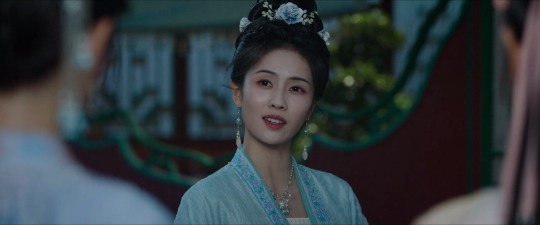
Of all the ways I thought Ning would handle the proposed slander against her beloved Zhang Zhe, the way she actually handled it did not align with my imaginings in the slightest. Sometimes what plays out is really better than the fiction in your head, hee. I did not see her calling out, not the dumb fiancee but the You-daughter. Nor did I foresee her half-drowning her in a jar full of goldfish.
FIERCE
Judging by the all the clips I have gorged on, this particular love line will be quite strong and trend for a while. Sigh. A decade plus of drama watching has whittled my patience for second lead to first lead love lines to whisper-thin nub but everyone keeps commenting on how amazing Zhang Zhe is so.... I guess the wait and watch won't be too grating.
...
I'm not sure I understand.
Zhang Zhe broke or bent his principles to help her on the oath that she'd become a good person thereafter.
Sometime later, Zhang Zhe is condemned to death for this.
Did he naturally get caught? Or did she deliberately sell him out? Was it more similar to the Yan Lin situation in which her people made moves without her knowledge and when push came to shove, she didn't make the necessary moves to upend the conspiracy for the sake of remaining Empress?
Whatever the case, it's clear Ning did many terrible things - some in ignorance, some in knowledge - to accomplish everything she achieved. I think she squared most, if not all of it with herself when weighing it against the ultimate end result... until Zhang Zhe ended up on the chopping block. I don't think she would have been able to write this sin off and once one stone in her ambitious bedrock was overturned, the rest likely came apart. It's why when she knew she was going to die she wanted her death to mean something, to be a reparation of sort to the only person remaining who might accept it because he thought she was worth something, because he's that good.
...
Oh. Oh. Look at the expression on his face as he listens to the patronizing, sexist drivel:
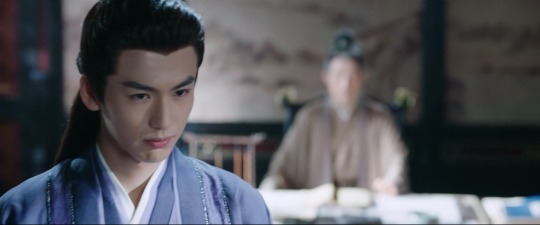
My scrumptious proto-feminist
...
LOL, he did a dignified catwalk and every lady in the room forgot to think and breathe!
I understand, ladies, I understand.
Geez, Ning, Xie Wei had them open a window for you, and only you, so you would have fresh air and bright light, to improve your mood and chances! Not to silently accuse you of being a potential cheat!
Wow, this is all up hill climb, my guy. Get your shoes with the best tread on, Xie Wei.
I know not a drop of Chinese and even I can see that's atrocious. And what did she draw in the corner. A flower? A dancing sun? A really fat, disproportionate hand with a vestigial finger?

And she asks, did she put too much effort into [failing]? Girl. It's so obvious she'd bring out the contrarian impulses of a saint. But maybe it's worth it since we get this face:
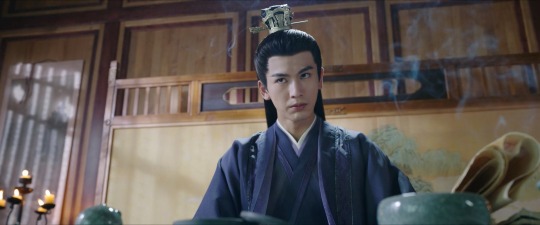
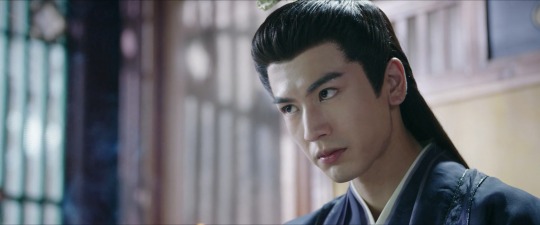
Teacher does not approve.
What I am enjoying so much in this scene is the action and counteraction. The way they each boldly challenge the other. She sent up an exam paper so abominable as to be a mockery [of him]; he passes her. She tries to expose her "stupidity" to the rest of the class; he threatens to critique the entire class, turning everyone against her idea.
point:

Counterpoint:

Concession:
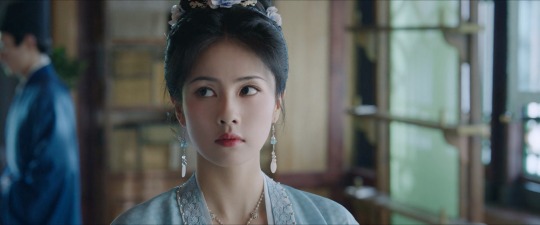
Me:
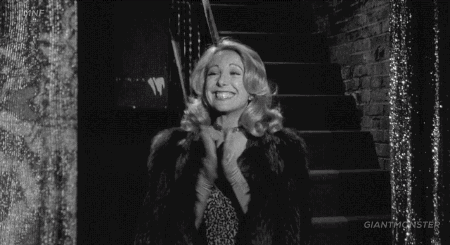
...
I'm not even touching the "dementia." Rolling my eyes and moving on.
But, but, but... How was he so spot on?! How did he guess at reincarnation?! I mean, yeah, he said he doesn't believe in the supernatural but it can't be a coincidence to the narrative that he's the first to come closest to the truth?
Xie Wei: Ning, what's your relationship with Yan Lin? I NEED TO KNOW... *whispers* for science.
Oh, your father asked me to take good care of you in the palace... Yan Lin asked me to help you... By the by, that study partner list? Yeah, another ministry generates it but ultimately it has to run by me. The moment I saw your name I marked you for the palace. After going to so much trouble, it would be stupid of me to release you from palace duties now!
Xie Wei, be like:
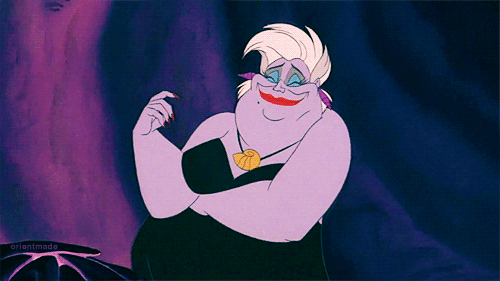
...
God. I Hate Ning's Mom.
#post#tv show: story of kunning palace#teevee#cdrama#xue ning#bai lu#xie wei#zhang ling he#gif#references film: young frankenstein#references film: the little mermaid
44 notes
·
View notes
Text
Mary Shelley’s 1818 novel Frankenstein is not, of course, an example of the imperial gothic but instead a still relevant anti-Enlightenment fable. If a novel ever illustrated how the sleep of reason begets monsters, it is Shelley’s story of how a scientist’s urge to create artificial life leads to utter destruction. However, in Universal Studios’s 1931 Frankenstein, the many pertinent philosophical issues that the original gothic novel explores reshape into thinly veiled imperial gothic through the introduction of a eugenic and highly racialised discourse that changes the monster from a rightfully vengeful and eminently intelligent being into an atavistic criminal. In its Hollywood guise, the monster is not a tragic, lonesome and then understandably vengeful product of unethical science but instead a reincarnation of the degenerate criminal whose brain the monster is provided with in the film. This takes on a peculiarly American dynamics in the movie. As Elizabeth Young suggests in Black Frankenstein: The Making of an American Metaphor (2008), a connection between the monster and the supposedly primitive black American was made as early as during the immediate post-Civil War period when ‘the “hideous progeny” of Shelley’s novel was symbolically reborn in racist parody as the symbol of the miscegenated nation’. An important reference to American Reconstruction history is also the ending of the movie. Instead of escaping to the North Pole, as is the case in Shelley’s novel, the monster is exorcised by what amounts to a lynch mob. In Frankenstein the movie, as in the American South, justice is done by the people on the spot; by ‘lynch law’. The violation of the sanctified space and body of Frankenstein’s fiancée, Elizabeth, as much as the accidental drowning of the little girl, justifies this public rage in the eyes of the movie audience. This is the end that comes to those who dare violate the purity of white women, or oppose the progress of modernity in any form, be they black Americans in the South, Native Americans on the reservations or unruly natives in the Philippines. Like so many lynching victims, Frankenstein dies in flames. In this way, the discursive conditions that informed the British colonial enterprise as well as the racism that structured black and white relations in the US permeate Frankenstein. The childlike and aggressive monster is an example of the kind of human category that can never ‘possess the intelligence to make a rational choice of political allegiance’, as Lansing put it. In addition to this, the audience is also free to imagine an alternative narrative in which Fritz never drops the jar with the ‘normal’ brain to the floor. It is not science or faith in modernity that Frankenstein fears, it is atavism. The resolution to the crisis that atavism constitutes is the sad but necessary violence of the lynch mob. When the monster has been burned, the movie can end with the happy union of the film’s central white couple.
Johan Anders Höglund, The American Imperial Gothic: Popular Culture, Empire, Violence
418 notes
·
View notes
Text
Bug-a-Bye and Goodnight
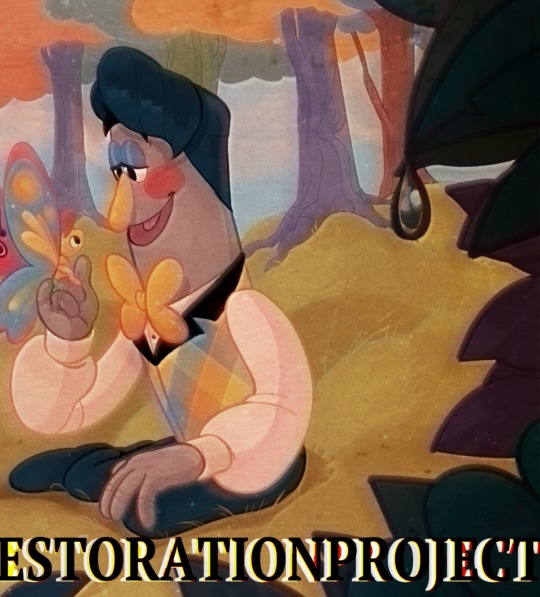
As always, I have edits:
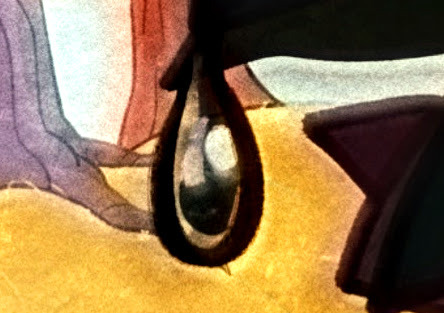
This will make more sense at the end.
I came across some theories about this song, and wanted to look at it in depth.
We are reading with the understanding that he may be referring to Eddie.
[A gentle piano and bassoon track begins playing.]
The sun is low, it’s cold and dark,— end of season, but could also be a reference to night and danger after dark
Just wind and snow, I must remark,
The bugs all head to slumberland,—interesting given the use of toyland, also the commercial about remderem/insomnia (some must sleep but Wally is in the opposite state. Too aware?), but could be a reference to death, like “the big sleep”
Some might find it sad, but I understand,—on face value, he will miss his friends, but knows that it is inevitable.
Even if I might not be able to see you,—can’t see Eddie because he is gone/buried
I know it’s for the best, I can’t keep you,—Eddie staying would lead to serious consequences for Eddie
It’s time for all of you to get some rest,—after what we saw Eddie go through, I bet he would be better in a different state
To tuck you all into your arthropod nests,—bug stuff; also Julie's hibernation?
At this point, those last few lines could refer to a sort of death for Eddie. Almost like frank can preserve him in some way by giving him a death in this universe. If we are talking puppet world, which we did see in commercials, most of Eddie’s anxiety happened in that state. So, can Frank give Eddie a suspended or death like state in one of the layers of reality and he is preserved in storybook world or our real world?
With one last check, that nothing is amiss,
I can see you safe into your chrysalis,—this reads that he will put Eddie into a different state of being that he can come back from. The coming back is my interpretation only at this point because I assume frank wouldn’t choose death for him or would for sure be hurt by Eddie’s death. Things would have to be very bad if true death is a better option for Eddie.
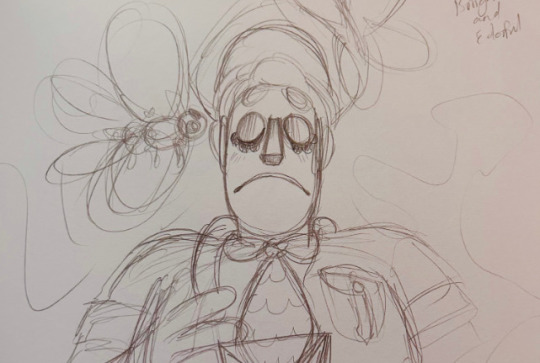
Also, it hearkens back to the horror butterfly image. Another also, caterpillar to butterfly, an insinuation of emedging into a new form. I don’t see allusions to Howdy in here, but I suppose it is possible that this could refer to more than one neighbor and Frank is taking them all out.
As you snuggle down into your dirt,—reference to being buried?
I want to assure you that I won’t be hurt.
This clarifies that it is a sleeping type state, not death. Ok, here is we’re Eddie’s Halloween costume comes in. Frankenstein, changed from the Scarecrow in earlier art (presumably from wizard of oz). Interesting thing about scarecrow vs. Frankenstein is that we see scarecrow taken apart during that film and Frankenstein is famously assembled from parts of different people. Interestinger is the fact that they are both afraid of fire. (I love that Young Frankenstein shows up more than the original in a search.)
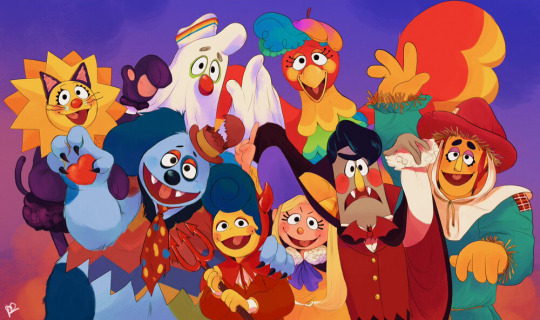
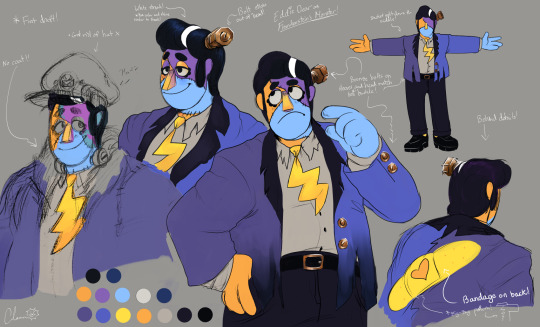
Frankenstein (and scarecrow) are both put back together, but for Frankenstein it seems more of a new being, not just a reassembling. Frankenstein (aka frankenstein’s monster) is a thinking, speaking individual that was horrified at the situation he was in. Frankenstein in the book murders to punish his creator for the immorality of creating him and the resulting loneliness that the monster feels. As such, the choice is very interesting. If the puppets of welcome home come to be aware or sentient, I wonder how they would feel about Ronald Dorelaine or their situation?
If the movie version is the focus of Eddie’s costume choice, then he would be a potentially thinking and feeling being (he is afraid of fire), but without further evidence we don’t know his thoughts.
Scarecrow is a guy without a brain, with the power of speech, so a kind of opposite. I think they all end up just needing to be confident, which is why some shyster from the Midwest is able to help. This almost seems to be more in tune with Eddie's character--Eddie has a tendency to appear kind of ditsy, is constantly being dismissed by others. In the end, we find out he is actually smart but lacks confidence. I can see that being true for Eddie as well.
If I had to pick out a character for Frank, it would be the Tin Man. Poppy is the Cowardly Lion, Wally is Dorothy. Home is Home. There are more parallels here than I was expecting. Howdy is the Wizard, Julie can be Glenda, and the Wicked Witch...is kind of no one? Sally can be a flying monkey. She works my nerve. Also, the whole spying thing was done by the monkeys in the movie.
But now that I am thinking about it, this comparison makes a lot of sense, in terms of the complex relationships, as well as the levels of reality that you find in Wizard of Oz. A big event leads to a shift in the understanding of reality, and the lead finds themselves in a very colorful world that doesn't much resemble their own, but is very flashy, has songs, beloved characters, and a sense of danger. There are some things when thought about in the context of real life, or the black and white portion of Wizard of Oz, would be truly frightening.
Of course, Wizard of Oz shares a lot of parallels with Alice in Wonderland, which also seems somewhat related. In terms of source material, the Wizard of Oz is considered to be a parable that expresses the thoughts about US economic policy in the 1890's. This is a theory that you can read more about here: https://en.wikipedia.org/wiki/Political_interpretations_of_The_Wonderful_Wizard_of_Oz
It isn't super related, and not everyone believes that this is the case. However, it seems to be a very American type story, no matter what you believe, that touches on the experience of normal people while much larger forces lie and fuck around with everything.
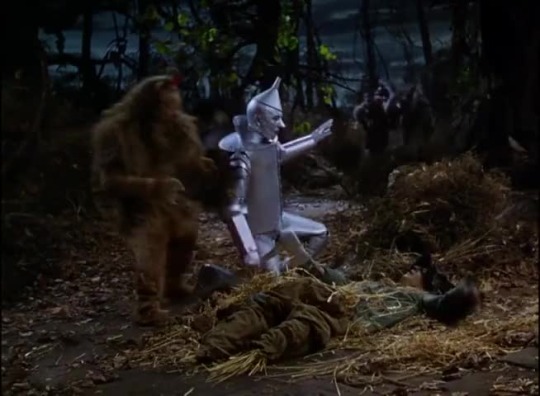
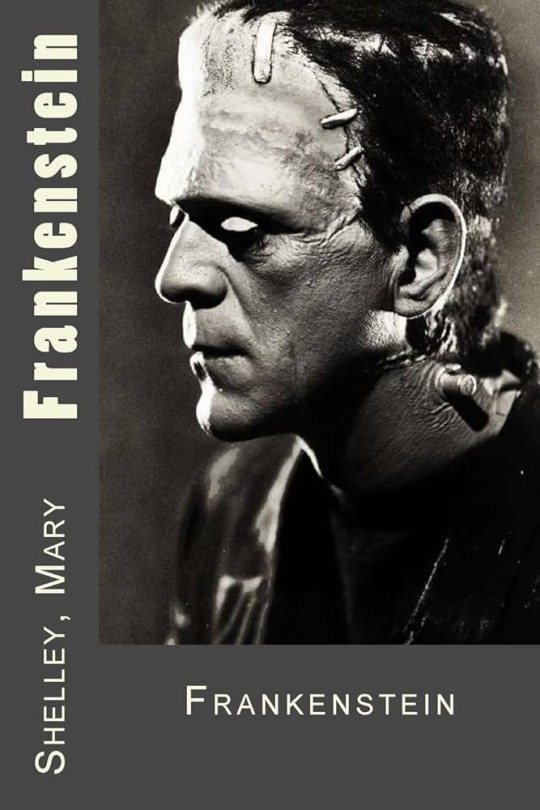
As the holidays begin to approach,
I gently kiss, each and every roach,—kisses for Eddie. We have seen a realistic roach on the secret page with the mishmash of one script where Wally is deciding what to draw
I made sure to keep, my garden cozy,
So you can safely sleep, in fallen posies,—this whole stanza shows a desire to and promise of a quiet death and maybe even a maintained grave. I looked up posies to see where Eddie could potentially be buried. Posies refer to a nosegay, or small bouquet of flowers. It was a Victorian secret code thing, a way to declare love or even reject people based on flower and color. One that sticks with us in the form of red roses signifying love. On the map, there is a cluster of yellow flowers to the side of Frank’s house. Not sure this counts as his garden, since it is on the other side of the house. Julie has a group of flowers behind her house, but once again, not his garden. No fallen flowers that I can ID.
When googling posey, this is what comes up. I felt that there was a flower called a posey, and these do look like the big yellow flowers by Frank’s house. If any flowers fall in updates, I am going to assume someone is buried there.
There is also the ring around the roses rhyme, which could relate, but I don’t really see a correlation.

It’s time to get comfortable in your honeycomb,
take your winter intermission in your garden loam,—dirt, burying again
neatly nestled from the cold in roots and rhi-ya-zomes, — cozy dead
sleeping side by side under stately stones,—2 dead? Headstones is the link I make there--OK, now look at the pic! (I know, it's a reach.)

…And I’ll be inside of my home,—frank is staying to oversee something. It reads like calming the person who will die. This seems to bolster that arguments that I addressed in the post about bugs on the previous website, that Frank is working against, or at least parallel to Wally. With the bugs, the whispering to Eddie, and using his first name, I think it is reasonable to suggest that Frank is working against Wally and/or Home.
Another potential clue is the hidden video with the clothespins where 1 is upside down. I have theorized that it is a reference to Barnaby dying, but it could be Barnaby and Eddie. Only one clothespin is shown upside down though, so Barnaby or Eddie?
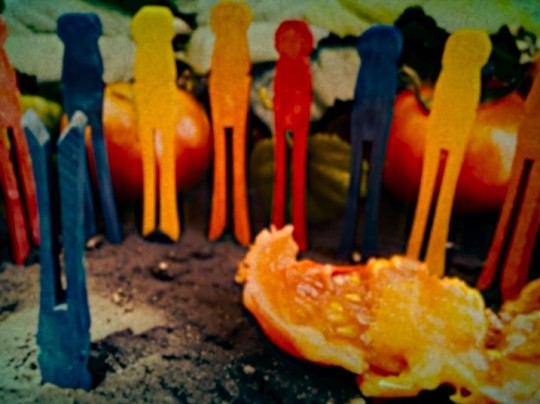
Regardless of how I feel you need to go away,
I’ll be the one to tell you, you just can’t stay,—he likes bugs but this is extreme of Frank, if he is talking about actual bugs
Thankfully I lack a sentimental sensibility,—true that, he generally seems calm.
I enjoy my Methodical Mundanity,—why is this capitalized? I looked and looked but I can’t find the origin of this phrase, though it came up a few times in random posts and articles. Clown does have a tendency to capitalize things that seem random. Me below is also capitalized. I listened as well, and I have to wonder why the singing is so bad? I don’t think the voice actors are bad at singing, seems like a deliberate choice to have reedy and unsteady vocals, pitch issues and pacing problems.
Where all that’s left is… Me.
So, this is a bit extreme for a song about hibernating bugs. I think that given our many references to bisecting or otherwise putting people into pieces (Eddie butterfly horror, frank in a pile of body parts, look I made a dog, and slinky Barnaby, now Frankenstein and Scarecrow) that we could be looking at death in a sense that works in one layer of reality. You disassemble a puppet, it is no longer a puppet. So what if Frank = Frankenstein and Eddie is Frankenstein’s monster? Frank can take him apart and put him back together in puppet reality?
If I had to guess, I am sticking with my working theory. Frank, as the smartest guy in the neighborhood, is the resistant force in the neighborhood. Wally/Home is/are the catalyst for the scary stuff. They are central to everything, physically and otherwise.
I have mentioned that in the last update, Sally and Poppy have the appearance of spies or managing Eddie. Given that Poppy doesn’t attend to party, I am anticipating that Eddie was isolated and watched by Sally during this planning period, where Wally and Barnaby walk the neighborhood to find out what Homewarming is. Given that it is said that Wally and Home instigated Homewarming, it is strange that everyone knows what it is except for Wally. It reads more as an attempt to achieve a goal, despite everyone knowing about the holiday. Even Julie is at the party, and she is supposed to be hibernating. Well, they don't say exactly when Julie hibernates (maybe there was something about her doing it after the holiday?) Anyway, Poppy isn't at Homewarming. She could be at home, but the book stating that they are all here seems like an attempt to cover up her absence. What is she doing? Snooping in the Post Office while Sally watches Eddie? Does Eddie want to go home for not feeling well or he has an idea of what is happening while he is gone?
Maybe Frank sees his boyfriend and comrade at arms about to get hit with something bad, so to preserve him and the opposition, he is going to disassemble him (cue Johnny 5) for protection.
In the past, Sonny (the Brazilian bird) was cast as the opposition to Wally, and included in a relationship with Frank. This work in particular comes to mind:
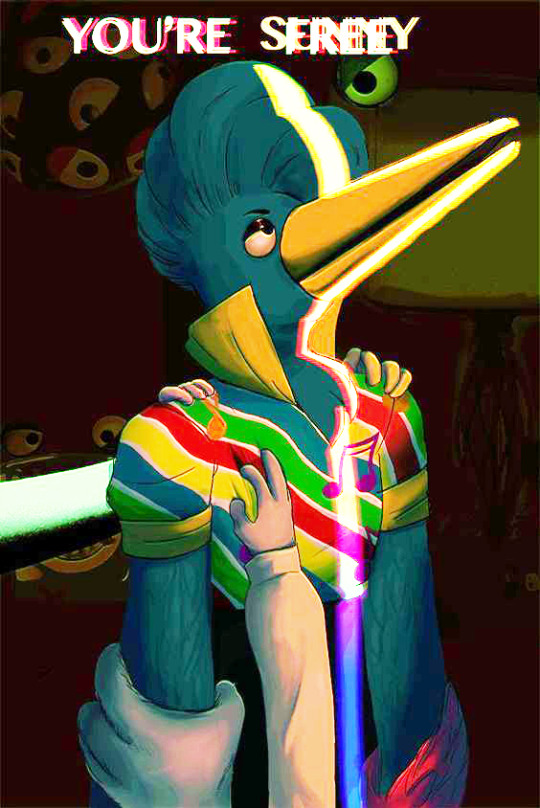
Clown has stated that they removed Sonny from the project due to the story changing from one with a hero, to one without, as that wasn't the story that they wanted to tell. What if, though, instead of Sonny being written out for the hero reason, there was another reason? What if we are seeing Frank taking on being the neighborhood's savior? He is just snarky enough to make it seem less like a hero situation and more because it was impacting his garden.
212 notes
·
View notes
Text
Neo Gothic: The Bibliography
These are meanings/refernces made in Neo Gothic, for those who may not have delved into the genre asmuch as they'd like...
This post is in reference to my series 'Neo Gothic' and as such some definitions are written towards to context of the story, this isn't a fool proof guide to the gothic, only a guide for my readers.
Part 1 / Part 2 / Part 3 / Part 4 / Part 5
References are in order of their mention, starting with part 1. Some are my definitions, other are from the internet.
The Gothic: A literary genre that combines Romance and Horror, Characterized by horror, Mystery, and gloom. Solidified as a genre by Horace Walpole, author of The Castle of Otranto.
Dracula: 1897 Cult Gothic Novel about vampire Dracula, who haunts a group from London, trying to turn or kill them.
Lucy Westenra: Mina Harker's best friend in Dracula, She is fed on, then turned, and eventually killed by the group. She was considered promiscuous due to her many suitors. She is given blood transfusions, however we now know the science behind these transfusions are outdated. She is finally killed in her vampiric form by beheading and a stake through the heart.
Carmilla: 1872 Predesscor of Dracula, it follows an isolated young woman who befriends a woman who turns out to be the vampire who has been drinking from her breast for years...
Carmilla (Character): An ancient vampire, often interpretated as a lesbian. In the novel, her death is achived by finding her resting place (her tomb), beheading her, and driving a stake through her heart.
Ann Radcliffe: Gothic author, known as 'The Enchantress', she published many acclaimed gothic novels in her time, including The Mysteries of Udolpho, she also wrote many essays that were published after her dath that have become acclaimed for their insight.
Rosemary's Baby: 1968 horror film directed by Roman Polanski, following a woman who is being victimised by a satanic cult.
The Exorcist: 1973 film directed by William Friedkin, following a girl who is possesed by an ancient demon.
Creed (Barbra): Professor of Cinema Studies, wrote collection of essays named "Monsterous-Feminine: Film, Feminism, Psychoanlysis"
Abjection: subjective horror, or someone's reaction to physically or emotionally disturbing subject matter
The Yellow Wallpaper: 1892 Novella by Charlotte Perkins Gillman, follows the descent into maddness of a victorian woman perscribed a "rest cure"
Dracula (character death): He is beheaded and stabbed through the heart, afterwards turning to dust.
The Castle of Otranto: 1764 novella by Horace Walpole, tricks reader into beleiving it is a true story of an ancient catholic family in italy, who are victim to spiritual haunting due to their transgressions.
Castle of Otranto Death: At the start of the novel, Manfred's (The villian) son is about to marry the virtuous Isabella, however in a tragic turn of events, he is crushed to death by a giant suit of armour, the helmet becoming stuck.
Frankenstein: 1818 Novella by Mary Shelley, follows Victor Frankenstein in his abjection after playing god, and bringing life to mixture of corpses.
Annabelle Lee (poem): explores the theme of the death of a beautiful woman. The narrator, who fell in love with Annabel Lee when they were young, has a love for her so strong that even angels are envious
Raven: Inspired by the poem, 'The Raven' by Edgar Allen Poe
Terror: Psychological fear, feeling like you're being watched/Thinking you heard noise.
Horror: The physcial reaction to fear, a scream, the unsettling shake when you're scared.
Sanguinary/Sanguination: involving or causing much bloodshed.
Sanguinary Rosebud: Reference to Angela Carter's short story "Lady in The House of Love"
Sublime: The state of all striking awe of the natural world.
Gothic Heroine: The gothic heroine is often characterised by her lack of agency or control in her situation. Often in a vulnerable position, she is often targeted by the immoral.
Naturalist: naturalism, in literature and the visual arts, late 19th- and early 20th-century movement that was inspired by adaptation of the principles and methods of natural science, especially the Darwinian view of nature, to literature and art.
Byron: Lord Byron was a romantic poet in the 19th century, well known for his sexual escapades.
Dr Bell: Bell was the last name used in the Pseudonmys that that Bronte sisters shared when publishing.
Dr. Purcell: one of sheridan Le Fanu's pseudonmys
Quarles: One of Edgar Allen Poe's pseudonmys
#criminal minds#spencer reid x reader#criminal minds prompts#criminal minds fanfic#spencer reid fanfiction#spencer reid fanfic#spencer reid fluff#spencer reid angst#spencer reid#spencer reid imagine
43 notes
·
View notes
Text
So I Saw Beetlejuice Beetlejuice
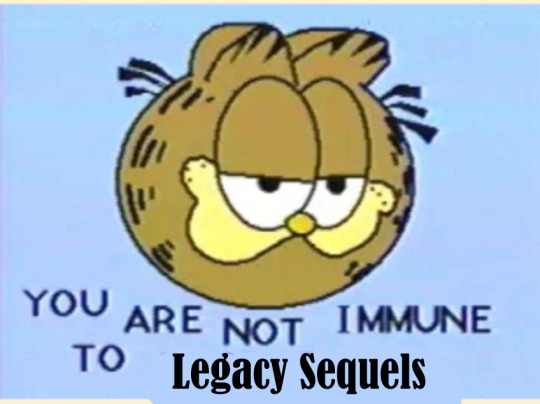
...and listen, I went in fully expecting it to suck ass. I was expecting my nostalgia to actually make me hate it even more for sucking ass than I would have if I had never seen Beetlejuice before. I figured it would be a lazy, heartless cashgrab, with tired actors awkwardly forcing themselves to play a caricature of their old roles and young actors given nothing to work with beyond oooing and aaahing at references to a movie that was made before they were born, directed by Tim Burton, a man who hasn't made a good movie since at least 2007, if not even longer.
So I feel really weird about saying it was actually... good? Somehow? Against all odds, it was good?
Like, I assumed it'd be a lazy rehash of the original, but no, it has a very distinct plot from the first film. It takes Lydia and Deelia Deetz and not only allows them to have grown from where they were in the original film, but keep growing to the end of this one. It uses Beetlejuice himself sparingly, shows new aspects of the entertainingly weird and surreal bureaucratic nightmare afterlife of the original, and actually makes a really strong theme about escaping from manipulative and predatory relationships.
There are references to the original, yes, but overall far fewer than I expected - like, there were so many iconic gags from the first film I expected them to repeat in a "See? It's like the first one!" nostalgia moment that just... didn't get repeated at all. On the other hand, there were clear jabs at the stupid bullshit OTHER legacy sequels have been doing - like, you know how the trailer had the groan-worthy "serious" cover of Day-O? Yeah, in the movie itself, the "serious" cover is sung in-universe in what is clearly meant to be a moment of comedic tonal dissonance - the very idea of using that fun song in a serious context is the joke. They also have a "baby Beetlejuice" gag where the baby version of the pre-existing characrer in question is a horrid little ghoul who spends every second of screentime being as repulsive and awful as possible. It's like it knew what I, personally, expected from a shitty Beeltejuice legacy sequel, and decided to goof on those tropes for my entertainment.
It's not perfect or anything - it has a shitload of subplots which it mostly manages to juggle really well but has, like, just one too many, but that one easily cut-able subplot also revolves around having a Monica Bellucci frankenstein, and I'm enough of a freak to admit I can understand not wanting to cut the Monica Bellucci frankenstein even if it added nothing to the movie beyond the pleasure of seeing a Monica Bellucci frankenstein.
But, like, it was funny, it explored a fantasy setting that honestly is ripe for more exploration, and it had surprisingly more heart than I expected. Like, it actually had more sympathy for both Lydia and Delia Deetz than the original, which is one of the flaws of the first movie in my opinion - it understands that Delia is kind of a great artist instead of maing her just a joke, and that Lydia's anxiety and grief actually has some true pain in it beyond "lol teenage girls are so overdramatic amirite," and it lets those two actually form a really great bond while ALSO adding Jenna Ortega's character into the mix kind of seamlessly? It helps that all three of these women have great chemistry together as actresses - Winona Ryder and Catherine O'hara play off each other so well, and Jenna Ortega adds this great third point to the dynamic the former two had in the original film, it's kind of inspired? And Michael Keaton's Bettlegeuse is used just sparingly enough, as he was in the first film, to be funny and threatening without wearing out his welcome.
It was good. I can't believe I'm saying it, but it was good. I enjoyed it, and I'm still kind of baffled by the fact that I did so. I can't believe I'm writing this in 2024, but Tim Burton finally made a good movie again.
44 notes
·
View notes
Text
THIS DAY IN GAY HISTORY
based on: The White Crane Institute's 'Gay Wisdom', Gay Birthdays, Gay For Today, Famous GLBT, glbt-Gay Encylopedia, Today in Gay History, Wikipedia, and more … January 20



c.275 AD. – St. Sebastian was born in the 3rd century AD. We know the date, but not the year. He is the patron saint of archers because he was bound to a stake and shot with arrows. He is also the patron saint of soldiers. As a beautiful young man he was the favorite of the emperor Diocletian who turned against him for embracing Christianity.
Some tales speculate that the Emperor Diocletian made romantic advances upon Sebastian and was enraged when Sebastian rejected him on Christian grounds. Other stories actually refer to Sebastian as the emperor's lover. Whether or not such accounts are legitimate, the image of St. Sebastian has been linked to homoeroticism.
According to the Church's official Acta Sanctorum, Sebastian, serving under the emperors Diocletian and Maximian, came to the rescue of Christian soldiers, Marcellinus and Mark, and thereby confessed his own Christianity. Diocletian insisted that Sebastian be shot to death by his fellow archers; these orders were followed, and Sebastian was left for dead.
These details—based on accounts written centuries after Sebastian's death and therefore largely apocryphal—may have helped form Sebastian's subsequent reputation as a homosexual martyr since his story constitutes a kind of "coming out" tale followed by his survival of an execution that may be read symbolically as a penetration.
In the Renaissance, Sebastian emerged as an extraordinarily popular subject for painters, perhaps rivaled only by Jesus and Mary; he was especially prized by artists who saw in the young saint a figure of Hellenic loveliness. Numerous painters—Tintoretto, Mantegna, Titian, Guido Reni, Giorgione, Perugino, Botticelli, Bazzi ("Il Sodoma")—recast Sebastian as a martyr beatifically receptive to his arrow-ridden fate.
It was primarily the Renaissance depiction of Sebastian that served a later, explicitly homosexual cult of St. Sebastian that took hold with remarkable force beginning in the nineteenth century, with Sebastian as an modern emblem of both a homoerotically charged object of desire and a source of solace for the rejected homosexual.


1900 – British actor Colin Clive (d.1937) is born in Saint-Malo, France to an English colonel, Colin Philip Greig, and his wife, Caroline Margaret Lugard Clive. He attended Stonyhurst College and subsequently Royal Military Academy Sandhurst, where an injured knee disqualified him from military service and contributed to his becoming a stage actor. Clive studied acting, and replaced Laurence Olivier in the stage play, Journey’s End, in 1927.
James Whale was the director of Journey's End. The two struck up an intimate relationship, and Clive played the lead in Journey’s End when it moved to the Savoy Theater in London in 1928. Clive was embraced by Whale’s theatrical friends including actress Elsa Lanchester. He followed Whale to New York City and Whale facilitated the casting of Clive in the movie version of the play.
Journey’s End was Clive’s first of 18 feature films. Clive appeared on Broadway in Overture. When the play closed, he went to London and starred with Elsa Lanchester in The Stronger Sex.
Clive is perhaps best known for playing the role of Dr. Henry Frankenstein in the James Whale-directed Frankenstein (1931) and in the Bride of Frankenstein (1935) with his friend Elsa Lanchester.
Though Clive was gay, he married actress Jeanne de Casalis in 1929, but the marriage was one of convenience, and they separated a short time later.
Clive was a member of the Brit ex-patriot actors in Hollywood including Lanchester, Karloff and Charles Laughton, and remained close with Whale.
The actor struggled with his sexual identity and suffered alcoholism and depression from an early age. His drinking became more and more problematic professionally. He often came to work drunk and passed out on the set. He was even fired from a starring role in a film when he suffered a breakdown.
Clive’s final film was in 1937, The Woman I Love. Colin Clive died on June 25, 1937, of tuberculosis complicated by chronic alcoholism. He was 37 years old. Actress Mae Clarke, one of his leading ladies, said, "Colin was the handsomest man I ever saw and also the saddest."


1945 – Gianni Amelio is an Italian film director.
Amelio was born in San Pietro di Magisano, province of Catanzaro, Calabria. His father moved to Argentina soon after his birth. He spent his youth and adolescence with his mother and his grandmother. The absence of a paternal figures will be a constant in Amelio's future works.
During his university studies of philosophy in Messina, Amelio got interested in cinema, writing as film critic for a local magazine. In 1965 he moved to Rome, where he worked as operator and assistant director for figures such as Liliana Cavani and Vittorio De Seta. He also worked for television, directing documentaries and advertisements.
Amelio's first important work is the TV film La città del sole, directed in 1973 for RAI TV and inspired to Tommaso Campanella's work. This was followed by Bertolucci secondo il cinema (1976) a documentary about shooting the movie 1900, and the thriller Effetti speciali. Two years later he directed the mystery La morte al lavoro, which won prizes at Locarno and Hyères festivals. The Little Archimedes (Il piccolo Archimede) of 1979 was also critically acclaimed.
In 1982 he debuted for cinema proper with Blow to the Heart (Colpire al cuore), about Italian terrorism, presented at the Venice Film Festival. In 1987 Amelio released I ragazzi di via Panisperna, about the lives of 1930 Italian physicists Enrico Fermi and Edoardo Amaldi, which won the award for best screenplay at the Bari Film Festival. 1989's Open Doors (Porte aperte), featuring Gian Maria Volonté, confirmed Amelio's status as one of Italy's best film directors and won a nomination as Best Foreign Film at 1991 Academy Awards. The film received also four Felix, two Silver Ribbon, four David di Donatello and three Golden Globes awards.
Also successful was The Stolen Children (Il ladro di bambini) in 1992, which won the Special Prize of Jury at the 1992 Cannes Film Festival plus two Silver Ribbon and 5 David di Donatello. In 1994 Lamerica, about Albanian immigration in Italy, repeated the fate and the success, with 2 Silver Ribbons and 3 Davids. Four years later, The Way We Laughed (Così ridevano) won the Golden Lion at the Venice Film Festival. Amelio gained another Silver Ribbon as best director for The Keys to the House (Le chiavi di casa), inspired to a novel by Giuseppe Pontiggia, of 2004.
Amelio was a member of jury at the Cannes Film Festival in 1995. In 2006 he released his eighth feature film, The Missing Star (La stella che non c'è), featuring Sergio Castellitto. From 2009 to 2012 he was director of Torino Film Festival, Turin.
Amelio came out as gay late in life, shortly before the release of his 2014 documentary Happy to be Different.


1974 – Michael Stabile is an American journalist and documentary filmmaker best known for his work in and about the pornography industry. His work has appeared in Playboy, The Daily Beast, Buzzfeed and Salon.com. In 2004, he and Jack Shamama co-created the gay pornographic soap opera Wet Palms for which they won a GayVN Award for Best Screenplay. He has also written several other GayVN-nominated movies including Spokes III, Cross Country, and Master of the House. Two of the films were included in "Top 10 Gay Porn Movies of the Decade" by Gawker Media's Fleshbot with credit given to the writing team of Stabile and Shamama.Since 2003, Stabile has edited Gay Porn Blog and in 2005 became producer of The Tim and Roma Show, a web-based talk show about the gay adult industry. In 2008, Stabile launched gay news site TheSword.com. He has been named "an arbiter of taste for gay porn" by the Village Voice.
Stabile has also been featured in the San Francisco Bay Guardian, the San Francisco Chronicle, Gay.com, Time Out, Cybersocket, and the Huffington Post.Stabile is working with Shamama and cinematographer Ben Leon on Seed Money, a documentary about Falcon Studios' founder and GLBT philanthropist Chuck Holmes, currently in production. Their documentary short, Smut Capital of America premiered at the 2011 Tribeca Film Festival on April 24, 2011. In late 2011, Stabile began working with Warhol Superstar Holly Woodlawn on a documentary about her life.


1976 – Mathieu Klein is a French politician serving as Mayor of Nancy since 2020. A member of the Socialist Party since 1992, he is also President of the Departmental Council of Meurthe-et-Moselle. After the 2020 French municipal elections, he became the first socialist Mayor of Nancy since the end of the second World War.
Mathieu Klein was born into a family of teachers in Phalsbourg, Moselle. Alongside his two brothers, he was brought up in Holving, before pursuing his secondary education at Sarreguemines. He moved to Nancy, France in 1993 to study history and sociology. He then continued his university studies in Paris.
Mathieu Klein has been a member of the Socialist Party since 1992 and his gave support in favour of a positive result in the French referendum on the Maastricht Treaty. He then became a student member of the National Union of Students of France in Nancy, then in Paris, becoming a member of its national bureau in charge of health matters.
In 1994 in Nancy he founded an LGBT association dedicated to the promotion of equality and fighting against homophobia.
In the 2020 French municipal elections in Nancy, Klein headed the Socialist Party, which took the first place in the first round on 15 March 2020, with 37.9% of the vote. Following this result, Klein merged with Europe Ecology – The Greens. In the second round, held on 28 June 2020, Klein prevailed with 54.5% of the vote. He was confirmed as Mayor on 15 July 2020 by 43 votes in the municipal council of Nancy, becoming the first left-wing person to exercise this mandate since the end of the second World War.
Mathieu Klein is homosexual and works in associations which are engaged in the fight against homophobia. He is married to a family doctor and the couple have three children.


1979 – Will Young is an English singer and actor. He catapulted to fame in 2002 after winning the inaugural UK Pop Idol contest. He has continued to work in music, and also as an actor.
Contrary to popular belief, Will did not come from behind to win the contest. After having beaten the widely-accepted frontrunner Gareth Gates in the final show, it emerged that he had in fact gained the most votes in six out of the nine weeks of the live show.
Young's first single was a double A-side featuring Evergreen and Anything Is Possible. In March 2002 this became the fastest-selling debut in UK chart history, selling 403,027 copies on its day of release (1,108,659 copies in its first week). It went on to sell over 1.7 million copies, and in the official list of the all-time best-selling singles in the UK issued later that year it was 11th. On 31 December 2009, Radio 1 confirmed that Anything Is Possible/Evergreen was the biggest selling single of the 2000s decade in the United Kingdom.
Young subsequently revealed that he was gay, in order to pre-empt a tabloid newspaper that was preparing to run a story 'outing' him. He also stated that he had never hidden, and was comfortable with, his sexuality.
Later in the year, Young met comedian David Walliams and the pair became good friends, with Young appearing at the Little Britain live stage show in Manchester, and later recording a podcast with Walliams, in which they chatted about various aspects of Young's career.
Will added acting to his repertoire when he accepted a role in the BBC film Mrs Henderson Presents, starring Judi Dench and Bob Hoskins. The film was released in the UK in November 2005 to excellent reviews — not least for Young's performance as both actor and singer in the film.


1980 – Yusaf Mack is an American professional boxer. He has held regional titles from the USBA (Now the IBF), NABA, UBA, and NABF. Mack has fought several former world champions, including Alejandro Berrio, Glen Johnson and Carl Froch.
Mack made his professional boxing debut at middleweight on November 17, 2000 in Biloxi, Mississippi. In his first 24 fights, Mack compiled a record of 22-0 with two draws. Throughout his early fights Mack moved between the middleweight, super middleweight, and light heavyweight divisions.
Mack is a father of ten children and was engaged to a woman. In 2015, he appeared in a Dawgpoundusa.com production titled Holiday Hump'n along with gay pornographic actors Bamm Bamm and Young Buck under the name Philly. He initially claimed he had been drugged by the film's producers and had no recollection of making the film, but later told WTXF-TV that he was gay and had lied to cover that up.
Yusaf later had a "coming out party" at Rage nightclub in Weho, a longtime landmark on the L.A. gay scene.


2012 – Three Muslim men from Derby, UK, were convicted of inciting hatred on the grounds of sexual orientation after they distributed leaflets calling for gay people to be killed.
In a landmark case, a jury at Derby Crown Court ruled the three had breached hate crime legislation by handing out the leaflets outside the Jama mosque, in Rosehill Street, Derby, in July 2010 in advance of a gay pride parade, as well as putting them through nearby letterboxes.One of the leaflets, entitled "The Death Penalty?," depicted a mannequin hanging by the neck from a noose. "The death sentence is the only way this immoral crime can be erased from corrupting society and act as a deterrent for any other ill person who is remotely inclined in this bent way," the leaflet read, as it discussed various methods of carrying out the death penalty for homosexuals.
Another depicted homosexuals burning in a lake in hell. A third showed the word gay laid out as an acronym to read "God Abhors You."


Today's Gay Wisdom
For The Straight Folks Who Don't Mind Gays But Wish They Weren't So BLATANT
by Pat Parker
You know, some people got a lot of nerve.Sometimes I don't believe the things I see and hear. Have you met the woman who's shocked by two women kissing and in the same breath, tells you she is pregnant? BUT gays, shouldn't be so blatant. Or this straight couple sits next to you in a movie and you can't hear the dialogue because of the sound effects. BUT gays shouldn't be so blatant. And the woman in your office spends an entire lunch hour talking about her new bikini drawers and how much her husband likes them. BUT gays shouldn't be so blatant. Or the "hip" chick in your class rattling like a mile a minute while you're trying to get stoned in the john, about the camping trip she took with her musician boyfriend. BUT gays shouldn't be so blatant. You go in a public bathroom and all over the walls there's John loves Mary, Janice digs Richard, Pepe loves Delores, etc., etc. BUT gays shouldn't be so blatant. Or your go to an amusement park and there's a tunnel of love and pictures of straights painted on the front and grinning couples are coming in and out. BUT gays shouldn't be so blatant. Fact is, blatant heterosexuals are all over the place. Supermarkets, movies, on your job, in church, in books, on television every day day and night, every place - even in gay bars and they want gay men and woman to go and hide in the closet. So to you straight folks I say, "Sure, I'll go if you go too" BUT I'm polite, so, after you.


19 notes
·
View notes
Text
fRankenstein Tier List 2.0
Featuring all the adaptations, reimaginings, and "inspired by"s that's I've experienced so far and remembered about. Rankings are based on faithfulness to the original text, how much I enjoyed them, and my own capricious wills

Described and explained below the cut:
(F)rankenstein Frankenstein; or, The Modern Prometheus (1818 book) by Mary Shelley Arguably the best adaptation of any source material is the original thing itself, but I'm not a philosopher
It's (A)live!!!! Frankenstein from the Royal Ballet Follows the source material possibly too closely, leading to a dull first act, but more than makes up for it with an Insane finale. Steven McRae as the Creature was phenomenal
Young Frankenstein (1974 film) Fun film and really good parody. They gave Frankenstein bottom surgery
Frankenstein (2015 album) by the Mechanisms Banger lyrics great song I love it when two characters are trapped in a spiral of their own making
(B)ack from the grave The Monsters We Deserve (2018 book) by Marcus Sedgewick Read it in one sitting and it thoroughly rattled my brain. Takes both the plot and the physical book Frankenstein and makes it about the responsibilities (or lack thereof) of creation
Lisa Frankenstein (2024 film) 52% on Rotten Tomatoes because nobody understands camp. It's fun it's gothic it's romantic I cannot recommend it enough. Honestly the only reason it's not higher is that I have to at least pretend to think about how these follow the original book
(C) what's on the slab Rock Horrors both stage (1973) and screen (1975), as well as Re-Animator (1985 film) and Bride of Re-Animator (1990) Very much not adaptations but undeniably heavily influenced by. I'll call them both fun*, note the asterisk, if you've seen either you know the parts I refer to in each
Secret Abilities and the Diary of a Teenage Frankenstein (2018 album) by, funnily enough, Secret Abilities Not convinced anyone in this band can carry a tune but that's neither here nor there. I really liked the idea of a choose-your-own-adventure album and their songs are fun! SNITCHES GET STITCHES is a delightful song about loving someone so much you'd sew yourself together with them to never be parted.
Young Frankenstein (2007 musical) Not necessarily a good musical, nevertheless a fantastic night out to watch it
Un(D)ead Frankenstein (1931 film) Look okay okay I know how influential it is I know it's rich me, renowned bad taste haver, putting it so low, but in adaptation terms it's not good and in film enjoyment terms I didn't. They fucked up the Creature's legacy :(
Poor Things (1992 book) by Alasdair Gray I feel a bit bad putting this so low, because on a technical level it is very well done, I just feel entirely middling towards it
?, ? Frankissstein: A Love Story (2019 book) by Jeanette Winterson. Still haven't re-read it, still don't remember anything about it. Storygraph assures me I gave it 3 stars on 1 October 2019, which could _frank_ly (ha!) mean anything
#you score highly for being an enjoyable good adapatation. you also score highly for being fun even if it's a little bit shit#thus are the joys of putting things into arbitrary categories#frankenstein#one of these days i'll reread Frankissstein and form an actual opinion on it
20 notes
·
View notes
Text
Lots of VC questions recently. Someone emailed about what they should be engaging with to develop their artistic voice. Here's my answer:
In terms of guidance, Werner Herzog, who is admittedly a weirdo, said that the best thing a film student can do is go backpacking cross country, which I would never do. But the point he was ultimately making is that life experience is more important than anything a film school can teach you. Your artistic voice develops more sharply the more intune you are with the world; all the film stuff is superfluous really. So that would be my major advice. Live life! Be open to all sorts of experiences.
Outside of that I would say to read and watch anything and everything you can get your hands on. Especially stuff that has nothing to do with film. Be curious, which is to say non-judgemental. Sitting through stuff that you have no interest in or actively hate is good! It develops your taste in ways that seeking out only what you like can never do. It also expands your horizons and teaches you how much you actually don't know about anything. Keeps you humble. You'll be surprised 5 years on how something that you had no interest in is super relevant to what you're trying to do.
I'll drop some recommendations later but something you are going to run into is paywalls and exorbitant costs. Scihub, Libgen, and PaywallReader can be your friends in this regard. The more niche something is, the less mirrors there are. Investing in an internet audio/video ripper is essential. Rip often and indiscriminately. Nothing is safe unless you triplicate it. And if you can't afford hard drives, dummy alphabet accounts are the next best thing. Also, footnotes and reference lists are treasure troves of breadcrumbs.
The standard VC reading list includes: Reel to Real, The Devil Finds Work, Playing in the Dark, Young British & Black, Ways of Seeing (also a documentary), Orientalism, Film Manifestos and Global Cinema Culture, Questions of Third Cinema, Hollywood & Counter Cinema, Figures Traced in Light, Parallel Tracks, and Basho: The Complete Haiku
Hundreds of films can be found on Solidarity Cinema. Cinema of the World has a deep archive but you need to have space and a nitrofile account to download most films, but you can snipe a few films here and there (or look for them elsewhere). Rarefilmm updates semi-regularly and you can stream the films; they are now more active on twitter and are even taking requests. Some state-sponsored film industries have robust presences on youtube with english subs: Russia's Mosfilm/FUSE Mosfilm, Canada's NFB, the Korean Film Archive, Native People's Media. There's UbuWeb for all your avant-garde needs. There's FIlmmaker's Co-Op (pay-per-view), Paper Tiger Television, and Deep Dish Television for NYC indie stuff. AfroMarxist has a fair amount of political documentaries. NMAHC has an archive that houses the work of Chamba Productions and some of Pearl Bowser's stuff. And of course there's the legendary MikeD of ReelBlack. It's a crap shoot but some filmmakers and/or their estates make work available free online (Leo Hurwitz and Julie Dash come to mind). I'd recommend a Kweli TV subscription for black film, and never be surprised by what you can find on youtube or tubi!
This is probably super overwhelming but the joy of being an autodidact is the thrill of discovery so peruse at your leisurely interest. The internet is your oyster if you know how to use it! Back in my day hardly any of these sites existed and the ones that did weren't as robust as they are now. I've had to frankenstein whole movies from various clips posted in 144p on youtube 😩
I used to do a couple of themed months a year where I'd read and watch as much as possible about a filmmaker, genre, or movement that interested me. I'd spin a globe to learn a little about a random country's cinema. Best of lists/canons don't really mean much but they are good sources of stuff to at least be aware of.
43 notes
·
View notes
Text
Only Human (A Suspenseful School Story)

A/N: In honor of Halloween, someone challenged me to craft a story about a character having a scary encounter with a teacher. As I was writing it, the images of Timothee Chalamet on the set of Marty Supreme came to mind because his attire reminded me of a college professor. Although my story has no relation to the film, I used the photos as inspiration for what this professor would look like. Enjoy the final piece!
Everyone was scared of him. He was the substitute professor that no one wanted to be left alone with. He filled in for teachers when they couldn't make it to class or were feeling under the weather.
He would drop in on a random Wednesday morning, and the dreaded sound of his brown loafers clinked upon the marble floor of the hallway. He always carried a black briefcase, whose contents remained a mystery. The rumor was that it housed a black list of all the students that clashed with him. Others suspected that he had dirty secrets stored within the confines of his case. There were even a few rumors were too foul to recount. Whatever the case may have been, there came the fateful day when I found myself sitting in front of him as he stormed into the classroom and slammed the dreaded briefcase onto my absent English professor's desk.
Upon first entering the room, I placed myself toward the back, where most of my peers were seated, but he wasn't having it.
“No. No. None of that,” he said, waving his hand dismissively. “Come to the front. How do you expect to learn anything if you're hiding back there?”
His look was unreadable, but one could only infer the pleasure that he felt by having such control over the room.
“Turn your books to page 394,” he announced to us, with an indifferent air. “Clearly you haven't made much progress since the last time I was here, which to be fair wasn't quite long ago.”
He said this as if he was annoyed at our teacher for falling ill once more. Working at a university was a hotspot for contracting a nasty virus, so it wasn't unheard of for teachers to miss class due to illness. However, I had to agree with him that it was happening more often than not.
“So, Dr. Frankenstein. Was he a villain or a hero?” the man said, thumbing through the pages of our assigned reading book absent-mindedly.
Someone at the back of the class scoffed and replied, “How could he be a hero when he very clearly released a monstrosity upon the world?”
Still flipping through the pages of his copy of the book, the professor looked at him over the rim of his wired glasses.
“Okay, so he's the villain then?” he prodded. The way he stared intensely at my classmate brought a chill down my spine.
“Maybe…” the student replied, clearly stumped.
The professor's eyes roamed the classroom, looking for the next victim to call upon. Desperately not wanting to be singled out as the next target, I took the leap myself and I raised my hand.
“Yes? The young woman in the front,” he said, motioning toward me.
That was another thing about him that was so obscure. Despite being only a couple years older than us, he always referred to the students as “young man” or “young woman”, which made it seem like he lived many more lifetimes than us.
“I’d say that Dr. Frankenstein was neither a hero or a villain. He was simply a human who contributed something into the world that he could no longer control,” I said, slowly making contact with his green eyes.
The professor nodded slowly. “Alright. Can you elaborate upon that perspective?” he asked, as he thumbed through the novel.

I took a deep breath and continued, “Well… it's like when you bring a child into the world. Yes, you’re responsible for teaching them and shaping them into a productive member of society, but you're only responsible for them to a certain extent because then they turn into individuals with minds of their own.”
I heard the sound of indifferent murmuring coming from the back of the room. I shrugged and quickly added, “I don't know, it's just my opinion.”
The professor looked at me with an unreadable expression upon his face. He looked as if he was mulling over how to respond.
Eventually, he broke the difficult silence and said, “That's just your opinion?” he repeated.
I couldn't tell if he was mocking me or not so I nodded hesitantly.
“I have the strong belief that our thoughts are not “just opinions. Instead, they are the foundations of ourselves, but if we're too afraid to own them proudly..." he said, looking at me. “...or voice them out loud at all..." he continued, his gaze trailed across the entire classroom towards the students who were clearly not interested in the lesson, “...then will we ever make any progress at all?”
“Whether Dr. Frankenstein is a hero or a villain is irrelevant. What matters is how you approach your perspective of him. Humans are unique beings with individual minds and points of view, but if we're all so close-minded and afraid to be wrong, how will we ever learn?” he said as he closed the book and placed it on the desk with a sigh.
I shrunk in my seat under his gaze. Tears prickled at the brim of my eyes from the intensity.
“You both clearly have a strong perspective on the topic, but you need to own those views. Have confidence in them,” he said to the other student and I.
I heard my classmate mumble obscenities under his breath at the professor. Whether the man heard them or not was unclear. Regardless, I figured that it was best that the teacher didn't respond.
The professor sighed and took a seat behind the desk.
“For the rest of class time, I want you all to write about why people are afraid to speak up for their opinions,” he said. If I didn't know any better, I'd say he directed the final word at me.
I slouched further into my seat in frustration just as my classmates began to protest.
“That's not fair! You can't assign us work that is not part of the curriculum!” protested a girl to my right.
“Oh, but I can if it will help you understand the material better,” he countered, his eyebrows twitching with obnoxious amusement.
Turning to face the entire class he continued, “So I suggest you begin writing. Class concludes in thirty minutes.”
A collective groan filled the classroom as I reluctantly began to write.
It wasn't fair. I was the only one who actually gave him a decent response, and he still managed to pick on me. I studied the teacher intently. With his old fashioned sweater vests and oversized blazers, it wasn't as if he was the image of perfection.
Therefore, I began to write. I wrote non-stop for the next half hour as I listened to the sound of the clock overhead, ticking down the minutes. After what seemed like an eternity, I heard the professor clap his hands intensely to gather our attention.
“Alright. I hope that by now we’ve found a response to this calamity of confidence,” he proclaimed.
I rolled my eyes and was certain that he saw me, but he didn't acknowledge the gesture.
“I need someone to share their writing aloud with me,” he said. “Any volunteers?” Unsurprisingly, no one raised their hand.
I held back a smirk as he stared back at the class, which ironically hadn't learned from his so called lesson.
That's when I raised my hand. I'll show him, I thought.
Seeing my hand in the air, he responded with the hint of a smile as he nodded and said, “Ahhh! One Brave soul. The floor is yours.”

I stood up and began to read from my paper.
“As a society, we are afraid of being wrong. We don't want to be seen as strange for having views that are different from the rest. There are certain people who are so intimidated by others around them and are afraid of making a fool of themselves in front of them. They don’t realize that others are just as afraid as they are, but they are simply better at masking it," I said.
“For instance, like I mentioned before, I believe that Dr. Frankenstein is neither a hero or a villain. He's just a man who is afraid to face the repercussions that his ideas brought into the world. I firmly believe that. Although it might be intimidating to say this in front of an audience whom it may seem knows better than us…” I looked at the professor dead in the eyes as I read this part.
“...this is clearly more than “just my opinion”. It showcases my views of how humans are more than right or wrong. We’re nuanced, and no one is exempt from learning from their experiences,” I concluded.
The professor began to clap slowly. “Impressive,” he said. “Glad to know at least one person took something away from today's exercise.”
The clock struck the top of the hour, and everyone was anxious to get out of the classroom, which was evident by the rustling of backpacks and shuffling the feet.
“Okay. I know you are all in a hurry to leave, but don't forget to finish the reading tonight. Your professor will know if you don't,” he said.
I picked up my copy of Frankenstein and stuffed it into my bag. I was in a hurry to get out of that classroom. I did not want to spend another moment with that obnoxious professor.
Just as I got out of my seat and headed toward the door, I heard a voice call out to me.
“Uh…miss?”
It was the professor. I grimaced internally. Couldn't he give me a break? I turned to face him with a blank look upon my face, and he motioned for me to come closer. My classmates exchanged weird looks amongst themselves over his sudden action.
“Good luck!" one of them whispered sarcastically in my ear, as he headed out the door.
I ignored him and walked towards the teacher.
“Yes?” I asked, with an arched eyebrow, uncertain of how to respond to the summoning.
“I want to thank you for your honesty today. I really appreciate when students take the lesson to heart,” he said sincerely.
“You're welcome. I only spoke what I felt was my truth,” I replied with a shrug. I observed him anxiously, uncertain of his ulterior motive for calling on me.
“That's important,” he said, with a nod. At this point, we were the only two people in the classroom.
“I know you and your peers must hate me for being so uptight all the time,” he said as he gave me a wry smile. “I don't blame you because believe it or not, I'm only a few years older than you all, and I've had my fair share of professors that I’ve butted heads with.”
I stared at him, contemplating how to respond.
“Then why pick on us? On me? I'm the only one who bothered to respond to your lecture properly, and you still humiliated me!” I exclaimed.
A look of guilt crossed his face. “I'm sorry that you felt that way. I'll admit that sometimes I take it too far, but it's only because I see potential in students.”
I was surprised by his apology. I'd never seen him so… Dare I say human?
“I've overseen many classes of students, and it's always the same. They're consumed by the fear of being incorrect and don’t speak up for themselves. I see that in you, and that's why I wanted you to gain confidence in your views,” he continued.
“You're right. Most people are simply better at masking their fears from others. Ironically, I preach about self-assurance as a manner of coping with my own fears,” he said, as he adjusted his glasses upon the arch of his nose.
“What do you mean?” I questioned, almost incredulously, at this man who I found it difficult to believe was intimidated by anything.
“Something most students don't stop and think about is perhaps how anxious professors are. All those eyes staring at them, lessons to prepare for, and the constant judgment from fellow staff members, especially when someone is at the beginning of their career. Perhaps students may not see it this way but instructing them in the power of courage and confidence not only helps them, but it gives me a purpose as well,” the professor replied with a shrug. “Kind of strange, huh?”
I'd never witnessed the professor be so honest and vulnerable. In a way it was quite touching to see him be so truthful with me.
“I guess it's not so strange," I admitted. “Going back to my opinion on Frankenstein,” I said, emphasizing the word “opinion” which prompted a smile from him. “We're all just people learning from our experiences. Sure things can be scary, but not everything or everyone is what meets the eye.”
The professor chuckled, and that was the first time I'd ever heard him release such a genuine laugh, which in turn made me smile.
“Well, I don't want to keep you any longer. I appreciate our little chat,” he said as he began to pack up for the day.
He opened the famed black briefcase, and I held my breath at the realization that I would finally be able to see what was inside. As he did so, a glob of something sticky spilled onto the counter.
At first I was surprised, but then chuckled as I realized what it was: a peanut butter and jelly sandwich.
The professor rolled his eyes with a slightly abashed smile and said, “I guess you know my secret now. This briefcase is just what I use to store my lunch in. It makes it less of an easy target for prankster students. Trust me. I'm not going back to the days of having my sandwiches stolen.”
I chuckled. As we stood there in comfortable silence for a moment, I couldn't help thinking how I misjudged him. Here he was teaching us about the power of self-worth where he was struggling to get by himself. He had a tough love way of teaching and building us up, but his heart was in the right place. Deep down, the professor was just one of us. Not good or bad. Only human. This was one belief that I would stand my ground on because that was nothing to be afraid of.

#timothée chalamet#timmy chalamet#fanfic#fanfiction#tumblr fanfic#timothee chalamet#marty supreme#halloween#mary shelley#dr frankenstein#frankenstein#mary shelly's frankenstein#school stories#university#student#college#school#professor x student#teacher x student#teacher x reader#education system#lecture hall#lectures#lecture#harry potter reference#tumblr writers#spooky story#scary#substitute teacher#substitute
10 notes
·
View notes
Text
Lisa Frankenstein

Happy to be watching new films again. Thought I might as well, since I’m laid out trying to recoup from an awful dog bite incident, to now also having Covid. What a win win situation, and I needed a feel good. 😫
This film is just cute, cute, cute! I love a good campy horror romance, and this film got the job done. Adorable actors, pretty aesthetic cinematography, lots of 80s goth references, which I love, and REO Speedwagon. Absolutely love me some REO.
Written by Diablo Cody, the creator of Jennifer’s Body, which is also another good film. We can all relate to Jennifer Check, but as for Lisa, she’s actually really me lol. I could see something like this exactly happening to me, and the makeover scene, is a straight given of what I’d probably do. I love all the posters in her room, especially the moon from A Trip to the Moon, and the Bauhaus one (who I also love). Zelda Williams also contributed co to the movie and her aesthetic and scene detail is absolutely great.
Really thankful for writers and directors who have made films like these over the years, cause in this sullen society, they keep our young hearts alive. It also inspired me into writing my own film quest. ❤️

10 notes
·
View notes
Text
Horror movie tropes that aren't as old as you may think
Vampires burning in the sun. The very first time vampires burned in the sun in fiction was in the 1922 German expressionist film, Nosferatu. Even the 1931 Dracula never said he would die via sunlight however the sequels to the 1931 Dracula movie did start using the idea that vampires would die in sunlight even though the Dracula novel and Carmilla novels had the vampires walk about by day but they were just weaker and could not shapeshift by day.
2. The first time werewolves changed during the full moon in media was in The Wolfman franchise started in 1941. In most folklore werewolves could transform at will. They were just more likely to be more wolf-like and wild on the full moon.
3. Werewolves in traditional folklore took on actual wolf form. The bipedal man-wolf was popularized from the 1941 Wolfman movie.
4. The first time zombies were NOT under a Haitian Voodoo Curse was in the 1968 film Night of the Living Dead. This was also the first Zombie Apocalypse movie.
5. The first time Zombies ate brains and the zombism was portrayed as a spreadable condition was in the 1985 film Return of The Living Dead.
6. "Vampires die from drinking dead Blood." this one started as a misunderstanding of a line from the novel Interview with the vampire. "You must stop before the heart stops lest the death takes you down with it." In the sequel novel The Vampire Lestat you learn that drinking dead blood won't actually kill a vampire, just make him really dizzy. Lestat describes it as a rolling delirium. No vampire in the world of Anne Rice actually dies from drinking dead blood and yet after the film adaptation of Interview with The Vampire (1994) suddenly you started to see the "Drinking dead blood will kill a vampire." everywhere. From The Queen of The Damned (2002) to the TV show Supernatural.
7. Vampires not showing up on camera. Vampires not showing up in mirrors dates back to the 1897 Dracula novel by Bram Stoker and may have its origin with some old Irish Ghost stories but the idea that vampires don't show up on camera is more recent and started in Hollywood.
8. Frankenstein's Monster on Mary Shelley's 1818 novel was intelligent, literate, and articulate within two years of his creation. Yet thanks to the 1931 film starring Boris Karloff most people think of the Frankenstein monster as having a flat head (he did not have a flat head in the novel, in fact he had long black hair), is child-like (He was actually very well-spoken once he learned how to talk in the novel), and he did not have bolts (or electrodes) in his neck int the novel. All of those things come from the 1931 movie Frankenstein.
Even the notion that the moral was not to play God mostly comes from the 1931 film and it kind of diminishes the accountability of those who mistreated The Creature. Also Victor Frankenstein (in the novel) wasn't even a doctor. He was a student of Metaphysics and he never graduated.
9. The Frankenstein monster being afraid of fire started with the 1931 Frankenstein movie. Bride of Frankenstein is where you first hear him exclaim "FIRE BAD!"
10. The 1943 film Frankenstein Meets the Wolfman is where we first get the idea of the Frankenstein monster walking around with his arms out stretched and stiff. This is actually because the film was heavily edited after test audiences who hadn't seen the previous film (Ghost of Frankenstein) were confused as to why the Frankenstein monster now spoke like Bela Lugosi's Ygor and was blind. Most didn't realize it was now Ygor in the body of The Creature. All scenes of The Creature talking were removed as well as reference to him being blinded. But him walking around with his arms out stretched because of the blindness were left in and so started the notion of The Frankenstein monster walking around stiff with his arms out stretched.
11. Igor the hunchbacked assistant didn't exist until the comedy Young Frankenstein. The Ygor of the Universal Monster movies had a twisted neck (not a hunchback) from a botched hanging attempt. He was played by Bela Lugosi in Son of Frankenstein and Ghost of Frankenstein. Dracula's assistant (who wasn't hunchbacked) was the bug eating mad man, Renfield. And Frankenstein's hunchbacked assistant was Fritz (ironically played by Dwight Frye, who was also Renfield). Dr. Niemann (Boris Karloff) in House of Frankenstein had a hunchbacked assistant named Daniel. And of course there was Quasimodo in The Hunchback of NotrDame. It was the Zeitgeist combining of all these characters that created the Igor trope now popular in comedies and films like Van Helsing (2004).
12. The Warrens were infamous con artists known in paranromal research communities as charlatans who knew how to tell a good story but after several books, TV movies, and then the Conjuring franchise, the zeitgeist notion of them is paranormal heroes instead of carnival-style con artists who charged admission to look at a Raggedy Ann Doll they kept in a glass case.
13. Annabelle was actually a Raggedy Ann doll, not a wooden doll. The version we're used to now started with the Conjuring film franchise.
14. Until the 1973 film The Exorcist you didn't hear that many "Ouija boards invite demons into your house!" stories. Or "I heard from a friend who heard from a friend..." Most legitimate paranormal researchers will tell you that the majority of ghostly encounters with the Ouija board are the result of something called the Ideomotor effect but because of what our pop culture has taught us, almost everyone now thinks of them as demon invocation devices and the subconscious convinces them that they are interacting with demons. Try to find a "the board summoned a demon" story from before 1973's The Exorcist movie or the Exorcist book. You won't find it.
15. An odd one is the Pentacle. The pentacle (five pointed star in a circle) is an old protection ward AGAINST evil that dates back to Ancient Greece and later used by Neo Pagans and Wiccans. in The Wolfman franchise the pentacle could warn you who the werewolf is, show who the next victim is likely to be, and even prevent the werewolf transformation if worn as a talisman.
The idea that it is something sinister and Evil has no roots in reality or even its first cinematic depictions. It was used as protection against werewolves as recently as An American Werewolf in London in 1981 (That was a free floating pentacle outside of the circle). It was even a protection symbol in Sleepy Hollow (1999 movie).
16. This one is debatable. There are people who claim that the idea of ghosts being translucent was the result of the Pepper's Ghost stage effect created in 1862, which used a pain of glass and a reflection to create the illusion of a ghost on stage for plays. The same effect is used today for Disney's Haunted Manion ride. However I am pretty sure that ghosts being described as whispy or cloud-like could indicate that translucent ghost descriptions do pre-date the Pepper's Ghost effect.
17. The first killer doll was in a 1960s episode of The Twilight Zone. Her name was Talky Tina.
18. The first blatantly possessed killer doll was Chucky in Child's Play (1988).
19. The idea of Dracula walking around in a tuxedo and cape started with Bela Lugosi's Dracula in 1931. If we went by the novels the Frankenstein Monster was the one more likely to wear a cape.
20. The idea that vampires and werewolves hate each other is a Hollywood invention mostly popularized by The Underworld franchise though it was depicted earlier in Tales from the Crypt. Dracula, in his novel, actually loved wolves and could turn into a wolf himself. This is described in the 1931 Dracula movie but his transformation into a wolf happens off camera and so is often forgotten.
21. Van Helsing as an action hero may have its roots with Peter Cushing in Hammer's Dracula franchise where Dracula kept coming back like a modern serial killer but this notion was mostly the result of Hugh Jackman's Van Helsing in 2004. Until then Dr. Van Helsing was usually an old man who beat Dracula using his intellect and knowledge of Dracula's weaknesses. "You are a wise man, Van Helsing, for one who has not yet lived even a single lifetime."
22. The sexy fem vampire hunter is mostly the result of Buffy The Vampire Slayer but you also see it in Van Helsing and Syfy's Vanessa Helsing. For once I'd like to see a woman vampire hunter dressed like Peter Vincent, and not a sexy variation on Peter Vincent's costume either.
6 notes
·
View notes
Text

Untitled Charles Condomine Fic
Part 1
Part 2
Part 3
Part 4
Part 5
Part 6
Part 7:
You got home around 5:30 and it was already getting dark out. You and Charles entered your apartment to an excited yowl from Church that you both were home. You walked up the stairs and stopped to pet him before he’d let you by, both of you. Once you’d fed him and changed into something more comfortable you felt a little better about the day. You left your room in your pajamas and seated yourself on the couch in the seat closest to the TV. Charles leaned against the armrest farthest from the TV and closest to the hallway to your bedroom. You looked at him and raised your eyebrow and smiled.
“Wanna watch a movie?” you asked.
“Oh, I don’t know,” he answered with a grin. “Which film?”
“You might remember this one, it’s one of my favorite movies,” you told him as you got up and went to the small shelf of DVDs you kept next to the TV. You bent over and searched for a minute before finding the one you were looking for. You took out the disc and put it in the player, turning on the TV with the remote and sitting back down, this time a little further from the screen and closer to Charles, on the middle cushion of the couch to see the screen better. The menu popped up a few moments later, the film you’d picked was 1931’s Frankenstein, starring Colin Clive and Boris Karloff.
“I’ll admit my limited knowledge of the ‘30s comes from horror movies,” you said laughing slightly.
Charles remembered this film. He’d seen it with a friend one night in the early ‘30s after his first wife had passed away. He didn’t remember much of it but he was happy to watch anything with you. He pulled you into his lap as the movie started, wrapping his arms around your waist and hugging you to him as he had the night before.
You gladly let him pull you against him, feeling the warmth you’d felt the night before as the rest of the room cooled. You settled in to watch the movie, your hands entwined. Charles flicked a finger and the lights in the room went out so that you could see the screen better. You were asleep before the credits rolled.
The rest of the week rolled by uneventfully, with Charles walking you to and from work each day, and you spending your days at work attempting to send the message that you were not interested to Alex as he spoke to you at every opportunity during the work day now, something Charles found especially disagreeable, and spending your nights with Charles watching old movies together on the couch. By Friday you were exhausted and ready for a break from work, and wished you were able to just spend your weekend with Church and Charles and nobody else, but you had to deal with Alex coming over tomorrow to help you unpack and presumably hit on you some more. You weren’t looking forward to this.
You told Charles as much as you walked home hand in hand Friday evening after work.
“Do you trust me?” he asked you earnestly.
“You know I do,” you told him almost instantly.
“Then don’t worry, I’ll take care of him,” he said, leaning in to kiss your temple as you strolled home in the snow. You’d grown rather used to these small shows of affection from Charles, and managed to convince yourself they didn’t really mean anything beyond friendly intimacy.
That night you took your usual places on the couch and watched what you lovingly referred to as “the 1935 classic, The Bride of Frankenstein.” You admitted to Charles as you watched that these movies had become some of your favorites because at a young age you’d developed a crush on Colin Clive, the actor who portrayed Doctor Frankenstein in the original films. He got a good chuckle at this.
“So you like old-fashioned men, huh? Good to know,” he said with a wink, resting his chin on your shoulder as you watched.
“Don’t get any ideas,” you warned him jokingly.
“My thoughts are as pure as the driven snow, I assure you,” he said with a fake haughtiness before pulling you to him and tickling you a bit until you giggled.
You both quieted down to watch the rest of the movie, you once again gently snoring into Charles’ chest before the end of the film, his arms around you and a blanket he’d covered you with keeping you warm. He couldn’t remember a time he’d been more comfortable being this close to someone as he was to you. You never wanted or expected more than he could give, you just wanted him around because you cared for him, you didn’t expect anything in return for your companionship. He’d never experienced that before. All his relationships in the past had been about what he could do for the other person in the relationship, whether it be casual or romantic. You’d helped him realize this by not being like that in the slightest.
After the film ended, he flicked two fingers at the TV, turning it off and leaving the two of you in darkness, Charles once again holding you to his chest as you slept, holding one of your hands in his and running his thumb over your knuckles idly, listening to your quiet breaths as he thought about what needed to be dealt with tomorrow. He leaned down and kissed the top of your head and settled himself in for the night.
“We’ll take care of it, darling, don’t worry,” he whispered without waking you.
The next morning you woke around 7:00, at this point not even surprised that you’d spent another night on the couch, it was becoming a habit at this point, one that neither of you minded. You untangled yourself from Charles’ arms around you and stretched before getting up, coffee and a shower on your mind.
“Good morning, love,” Charles greeted you as you woke yourself up enough to walk to the kitchen. He smiled at the mess your hair was this morning, he thought it was adorable.
“Morning, Charles,” you smiled back at him, a little puzzled as to what he was so tickled by but not worrying about it right now. You sleepily walked to the kitchen and got the coffee going before you went to the bathroom to shower. You returned to the living room about a half hour later, dressed and as ready as you were going to get for a morning and afternoon spent in the company of your least favorite coworker. You filled a mug of coffee at the counter in the kitchen and returned to the couch, sitting next to Charles and sipping it slowly, staring ahead. It always took you a while to wake up in the morning before you were capable of coherent conversation and today was no different.
You sipped your coffee for a while, finishing the cup and moving on to your second of the day, pouring it and taking your seat back on the sofa. Charles laid a hand on your knee to get your attention.
“How are you feeling, darling?” he asked, with no regard to the way that particular pet name made your heart rate speed up and your breathing quicken when he used it. But you didn’t have time today to worry about your feelings. You turned yourself to face him, sitting cross-legged on the sofa, holding your coffee in your lap.
“I’m okay, I think. I can get through this day. I’ve been through much worse,” you answered, no trace of a smile on your face. Charles hated to see you looking so defeated. He shifted in his seat and took your hands. You looked up at him, your eyes were dull and tired.
“Listen, I think I can solve your little problem here today,” he said. “You just have to trust me.” He squeezed your hands gently, and explained his plan to you.
Alex arrived at exactly 9:30, toting two cups of coffee and an insincere smile. He kept his finger on the doorbell until you answered, which immediately got you irritated at his impatience. You made eye contact with Charles and rushed downstairs to answer the door and make the noise stop. You opened the door and stepped aside to let Alex in the door. He handed you a coffee from the shop around the corner, which made you smile a little, remembering that meeting you had with Charles the day after you’d met him. You hadn’t been back to the shop since, too embarrassed to show your face there yet.
“Hey, there,” he said as he walked past you and up the stairs, waiting for you on the landing. You climbed the stairs and met him at the top. It was snowing outside and Alex had already shed his wet coat and unceremoniously tossed it onto the chair by the staircase in the living room. He wandered over to your entertainment center and bent down to inspect your DVD collection on the set of shelves located next to it.
“You like horror movies, huh?” he asked.
“Yes,” you answered curtly, setting your coffee down on the kitchen table before joining him in the living room. You internally rolled your eyes, waiting for the judgement on your movie taste to come, and just like clockwork, it did.
“I hate horror, I always thought something had to be wrong with a person to like watching things like that,” he said haughtily. “Not that I think that about you, of course,” he added quickly.
“Mmhm,” you responded, raising an eyebrow. “Well, I guess we should get started right? I thought we’d get the Kitchen unpacked today.”
“Sounds great to me,” he said, joining you at the threshold of the small kitchen and throwing an arm around you. The kitchen light started to flicker slowly, then more lights in the apartment followed suit. The lamp on the table buzzed and lit up brightly before the pop of a broken bulb emanated from under the shade. The same happened to the overhead light in the kitchen and then the living room. Alex dropped his arm from around you and froze, unsure what to do.
The apartment was quiet now, and you hadn’t seen Charles since you went downstairs to answer the door. But you knew he was here, you could feel his presence.
“What the fuck was that?” Alex asked. The room began to grow colder as he spoke. His breath left him in a puff of smoke that dissipated quickly. “What’s happening?”
“I have no idea,” you said, hoping he couldn’t hear the amusement in your voice. You were supposed to be playing scared. Then the TV flickered to life, showing a fast succession of gory horror sequences from various movies in your collection. The famous pea soup vomit scene from the Exorcist, “They’re heeeeere” from Poltergeist, and many others flickered past each other, one after another, the volume on the TV going from 0 to 100 quickly, filling the room with the sound of screams and a chainsaw blaring. Then it shut off, leaving the room still as death, no light except the snowy white light coming through the curtains in the living room window.
“Fuck this,” Alex exclaimed, grabbing his coat and running down the stairs. As soon as the door slammed behind him you burst out laughing. Charles came out of the bedroom where he’d been hiding to make it easier on you to pretend you couldn’t see him, a bright smile on his face that grew wider at the sound of your laughter.
You felt a little guilty scaring Alex like that, but you did NOT have any intention of fending off his advances for the entire duration of your employment together. Now that was a scary idea. You still felt a little gross from having his arm wrapped around your shoulders. And you knew he wouldn’t tell anyone, they would think he was insane.
You rushed over to Charles, wrapping him in a tight hug that he returned gladly.
“Thank you,” you said, burying your face in his neck.
You stood there for a while holding each other in the dark before Charles pulled away a bit to bend down and place a gentle kiss on your lips, running his thumb over your cheek as he did so. "Of course," he whispered.
Part 8
2 notes
·
View notes
Text
Twelvegate Theory: Drowning in the Quarry and Will & El (Part 1)
I found some interesting information while analyzing Stranger Things and taking note of the movies that we are shown in the show. In particular, I was mainly focusing on any scenes including Will, El, Joyce, Jonathan, and Hopper. . . because I think something bigger is going on that the writers want you to catch onto, but we don't get the full account of what truly happened (and probably won't!) until S5. The colors are so I know which character I'm talking about, and so this format can also be used later with my other twelvegate theories.
First off. . . there are only three characters directly associated with the quarry (in terms of scenes happening standing on the edge of the quarry).
Mike, Will, and Hopper.
Mike, because he steps off of the ledge and falls (then El saves him) and Will because we find his (fake) body there. Hopper, because he and Callahan are on the edge of the Quarry looking down while searching for Will.
The other direct association with characters to the quarry would be the night that the body was found.
State Troopers found the body. State Trooper, David O'Banon, found Will's body, and Hopper later interrogates him at Hideaway, the bar. Mike, Dustin, Lucas, and El are there on the shore as they pull the fake body out of the lake. Mike gets mad at El because she couldn't find Will, alive. (This is the only direct association we have of El and Will being at the quarry at the "same time" and "one body was found 'drowned'," in the quarry.)
But there are some characters that are associated with the quarry indirectly as well. . . Like Lonnie blaming Sattler's Quarry for what happened to Will. Joyce and Hopper talk about the police and the working theory on how Will fell into the quarry. El watches Frankenstein, alone, in S2 on Halloween night. The young girl in the film, Maria, is talking to Frankenstein's Monster. It isn't shown on screen for long, but after looking up the movie, I learned that Maria drowned in a lake after asking the Monster to play with her.
So, now that we have the direct and indirect associations out of the way. . . we can get to the more interesting connections and parallels that I found!

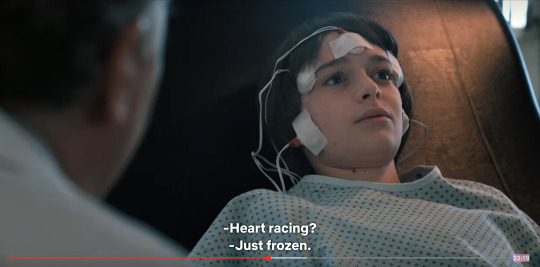
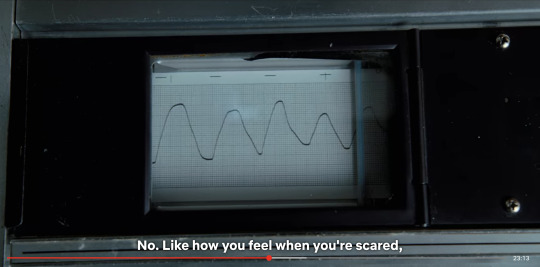
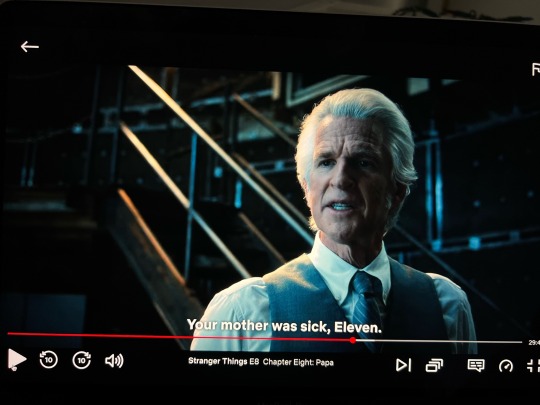




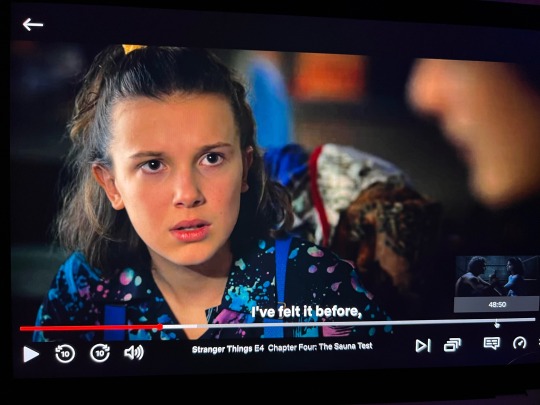
Okay... So, there's this establishment of the Upside Down/ The Mind Flayer/Henry/Vecna/001's presence as being cold. . . and Will feels scared [frozen] because of it. I find it interesting that the line "I've felt it before," from S3 is actually panned on El and Will, but the focus is on El. Brenner makes the association that El's mother was sick, very sick. Lonnie makes the association that Joyce is sick to Jonathan, as well.
And then, we have the other freezing references.
Lonnie's "Your Mom was half frozen to death when I got here." after Joyce sees Will in the wall, and the Demogoron comes back.
Hopper's "I'm gonna freeze to death out here." after his fight with El, because he wouldn't let her see Mike in person.
The initial connection that I was focusing on, was the parallel of Joyce freezing to Hopper freezing in the scenes above.
Now, this is where it gets interesting:
In 1983, when Will goes missing, there's this shot while Ted and Karen are watching the news on the night of November 7th.
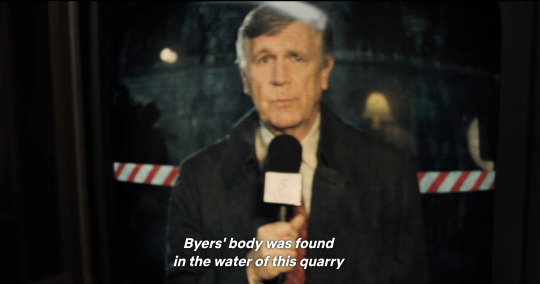
We don't hear much of what the reporter says, but what he says is crucial information.
"Byers' body was found in the water of this quarry by state police earlier this evening. It was discovered by State Trooper, David O'Bannon, just after dark. The state police are mounting an investigation to determine Byers' cause of death, but an initial inquiry. . . [indistinct]. . . Byers isn't the first person to drown in Sattler's Quarry. You'll recall only seven years ago. . . [news reporter cuts out],"
1983 - 7 years is 1976.
(I'll come back to this! )
---------------------------------------------------------------------------
In 1984, on Halloween, we see that El is watching Frankenstein.
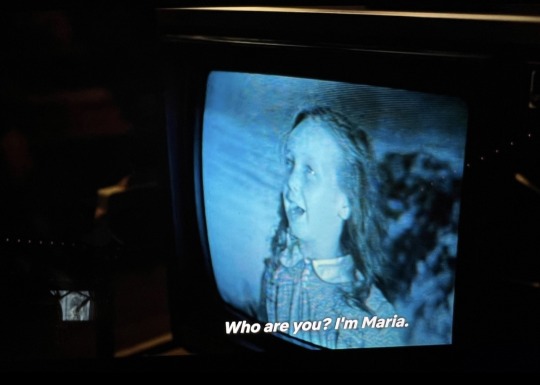
This is one of the shots that we see of the movie Frankenstein (1931).

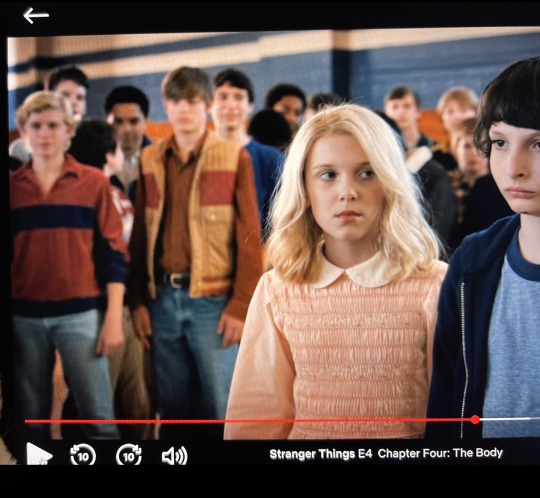
Look familiar?
In the 1931 version of Frankenstein, Maria drowns in a lake after attempting to play with Frankenstein’s Monster. The monster misinterprets the rules of a game, and Maria dies by drowning in a lake.
-------
We know that "El" is short for "Eleven". . . Mike gave El that nickname. . . and we assume that Terry Ives is El's mother.
We also know that El is known as "Jane" by Terry in season 2. . .but I truly don't think that El is Terry Ives' daughter. . . (I'll come back to this! part 2.0)
---------------------------------------------------------------------------
Now, I noticed something in Season 1 that made me think of the year 1976 a little differently. . .
1976 is the year that Will and El turned five years old.
1976 is the year that Will would have gone into kindergarten at the age of five. 1976 is also the year that Mike meets Will on the swingset, and there is an emphasis on the fact that Will is alone on the swings, but Mike felt less scared because Will was alone on the swings too.
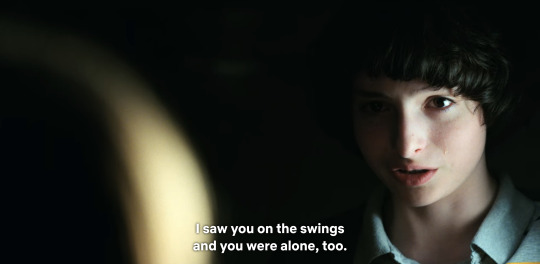
Mike is Will's first friend. . . and Mike is also El's first friend. . .
Mike gave Eleven her nickname of "El". . . so is it really that much of a stretch to assume Mike gave Twelve a nickname of "Will" because "Well" wouldn't work as a name? (Obviously this would need some explaining, and the timeline would be off. . . But the timeline that we’re told is already askew…)
In season 2, in 1984, when El goes off on her own to find Mike at the school, she ends up at a house where a woman and her daughter are playing on a swing-set. One swing is left alone, while she flips the other over the top of the swing-set.

Now, I didn't think anything of this, until I paired it with what Mike said about meeting Will on the swings. And then, I thought of this scene of Will and Joyce:
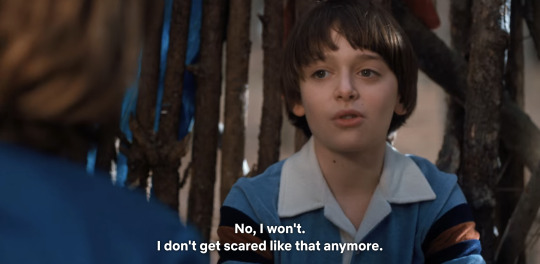
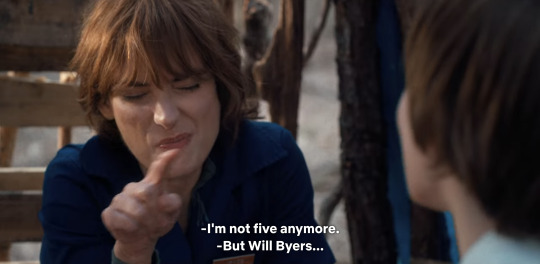
So. . . what happened to Will when he was five years old to scare him enough that he had nightmares for a week?
Maybe he saw a "monster"? Maybe he met a monster that tried to take him (and/or someone he was very close with) somewhere against his/or their will?
I think El was the first "drowning" [read: kidnapping] victim in 1976 in Hawkins. . . and I think Will might have gotten away (at least for 2 years).
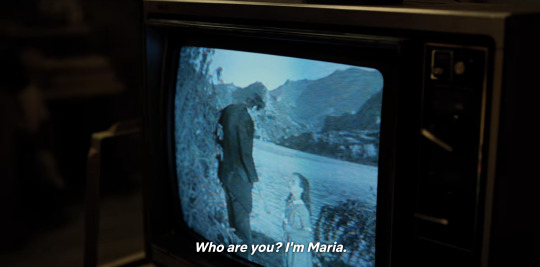
In season 4, there's this association of Brenner with the word "Monster". And this only shows up in the titles of two Stranger Things episodes. . .


In Season 1, we assume the "Monster" is the Demogorgon. . . and by Season 4, we learn that the real "monster" is Dr. Brenner. . .
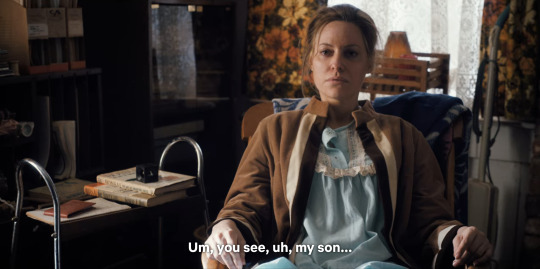
Joyce and Hopper visit Terry Ives in S1 Episode 6 (The Monster). . . Terry has two books on how to care for Bonsai trees. . .
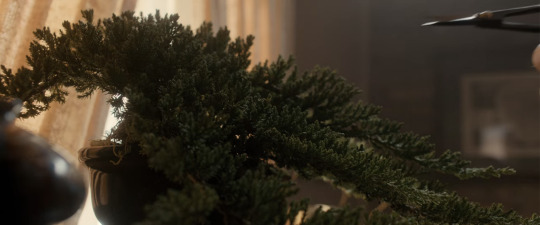
In the opening of S4, Brenner is trimming his Juniper Bonsai tree. . .
Then, we have this shot of El searching for her "mother" in S2:
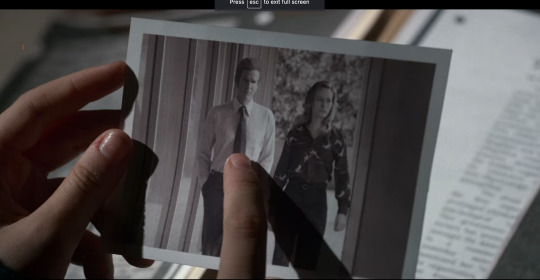
El finds a photo of Terry walking with Brenner almost as if they are equals. . . But Terry was accusing this man of kidnapping her daughter by the accounts of almost every newspaper Hopper found?
Hmmm . . . that's very suspicious if you ask me.
I think Terry is "Mama" to Brenner's "Papa".
Because in S4, we get this from El's "memory":

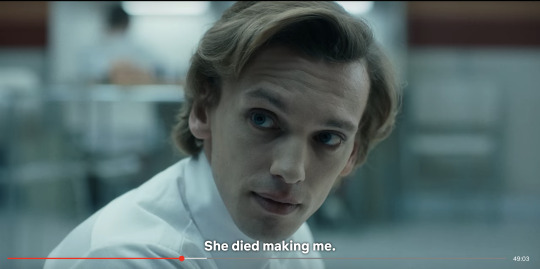
Brenner (at one point) told El that her mother died giving birth, but we know that wasn't true.
I think that Terry and Brenner might have managed to kidnap a set of twins from their parents. . . within a two year span. I think El was taken first, in 1976. . . and Will was taken second, maybe in 1978. Maybe something didn't go according to plan, and Brenner finds himself with a mess on his hands. Either way, we find that Brenner electrocuted Terry Ives in 1978. And we find that Hopper's daughter Sarah died in the hospital in 1978 at seven years old from cancer.
(Keep in mind, the hospital we are shown from Hopper's memories, looks eerily similar to the "hospital" section of Hawkins lab.)
We also learn in S4, that Brenner and Owens aren't showing El the full memory from The Hawkins Lab Massacre, because we get these scenes as well:
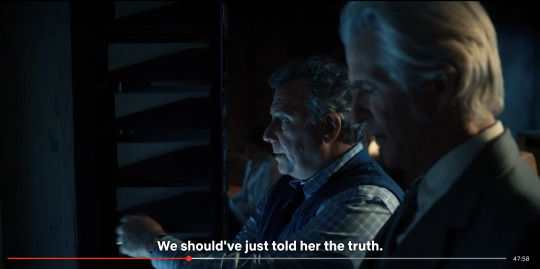
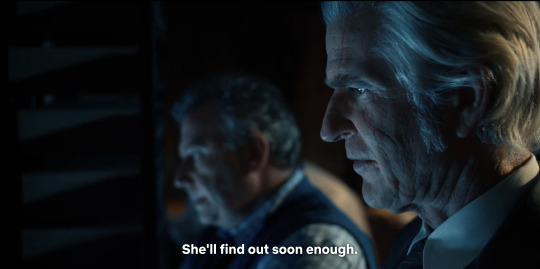
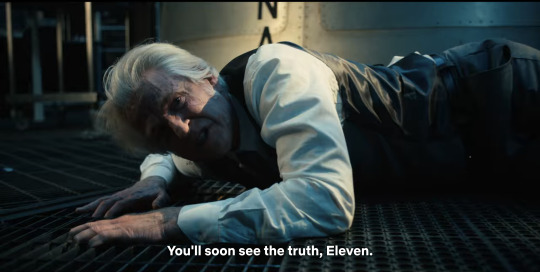
What secret would Brenner and Owens have the answer to that could compromise the whole of the NINA project? That could - as Brenner puts it - "Risk everything?"
There's an emphasis on fail safes in season 4 as well. . . Max's letters acting as a fail safe, Nancy and her plan to kill Vecna -> the thought that Vecna can't hurt anyone else if they kill him (but her plan fails and there was no back up plan). . .
When Owens tells El that she is the cure, he says "I wouldn't be here if I didn't think this was the only way. If I didn't think that you were the only one who might have a shot to hit this thing so hard that it can't get back up."
His use of the phrase "the only one" implies that there might be another person that could help take Vecna down, but they aren't ready yet. . .
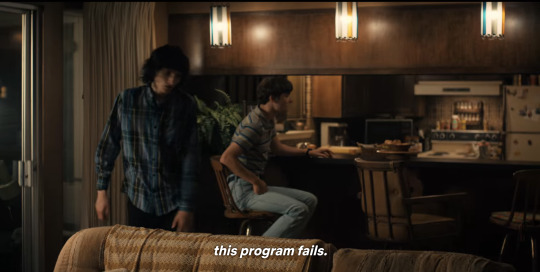
So. . . Will might be the fail safe, but Brenner and Owens don't want El to know the truth? That she has a [twin] brother? Because they know that she would refuse to have him put in harm's way?
(I am making a part 2, because this it a bit long, and part 2 is detailing more on Will.)
(again, i'm not 100% certain on this, there's a lot to explain in terms of plot holes, but it's a theory, so just roll with it)
#twelvegate#the wonder twins#wondertwins#willel#byers-hopper siblings#will byers#mike wheeler#el hopper#jonathan byers#joyce byers#Jim hopper
90 notes
·
View notes
Text
A comprehensive list of every single Frankenstein adaptation i have ever read/watched and my reviews of them
Universal Frankenstein 1931
I hate this movie with my whole being. It's like they read the book upside down and backwards. Hate the creature's design. 1/10
Young Frankenstein
A hilarious spoof of the Universal film. Gene Wilder kills it as Frederick von Frankenstein. Creature design is much better than Universal, I love the non functional zipper on his neck. So silly and goofy. 9/10 (minus one point for Creech fucking being an important joke/plot point bc it makes me uncomfortable)
Junji Ito's Frankenstein
A mostly faithful comic adaptation of the original novel. Creature design is fantastic but he has short hair for some reason. Very cool art. 8/10
Frankenstein Alive, Alive!
Literally my favorite graphic novel. Bernie Wrightson cared about the Creature so much and it really shows. Incredible adaptation exploring the rest of Creech's life. 11/10 cannot recommend enough
Frankenweenie
Great Tim Burton movie. I love Sparky. Another successful spoof of the Universal film. 7/10 (minus points for being lowkey racist/xenophobic)
The Rocky Horror Show / Picture Show
I'm lumping in the musical and movie together. I love RHPS with my whole being. And it's a weirdly good adaptation. Dr. Frank N Furter's desire to create the perfect artificial man is explicitly queer. Rocky is born and immediately starts singing about how he's confused and miserable. 8/10
I, Frankenstein
Not a great movie but I did kind of enjoy it. Adam Frankenstein is caught in the celestial war of good and evil because he is neither human nor demon. His design sucks because he's just a guy, not nearly fucked up enough. Also he's not an incel which is very out of character unfortunately. 5/10
The Dark Descent of Elizabeth Frankenstein
What the fuck is this book. Reading it was a roller coaster ride of "ok i dig this" and "what the actual fuck am I reading". All you need to know is the author sucks the human soul out of Victor and makes Creech a furry. 2/10
Frankenstein: A New Musical
I love this musical!! It's mostly book accurate with great portrayals of every single character. The original production's Creature design sucks though, it's literally just the actor with no prosthetics or makeup or anything. The music ranges from average musical stuff to absolute bangers. 9/10
Edward Scissorhands
I love this movie so I'm counting it because the Inventor makes an artificial human which is basically Frankensteining. Edward is adorable I love him so much. I think the movie is a great metaphor for the treatment of disabled/neurodivergent people in society. 8/10
The Nightmare Before Christmas
Specifically Sally and Dr. Finkelstein. Dr. Finkelstein is a super shitty dad to his creation, and Sally just wants to go out in the world and be a normal monster girl. As a Frankenstein adaptation 9/10 also 10/10 movie
X Files: The Post-Modern Prometheus
Incredible retelling with fantastic references to the original text. Mulder and Scully get justice for a monster in a crazy small town. And the episode is in black and white for no reason other than drama. But for some reason the Creature, who is called El Mutato, r**es people so for that unfortunately 7/10
#Ary's Frankenstein masterlist#idk why i left this in my drafts for so long#Frankenstein#mary shelleys frankenstein#gothic lit#books#bookblr#classic lit#frankenstein or the modern prometheus#gothic lit memes#book review#movie review#tw sa mention#frankenstein
20 notes
·
View notes
Text
The Origins of Dracula

The legend of Dracula and vampires is one of the most enduring and influential in the horror genre, with roots in ancient folklore, literature, and cultural mythology that long predate Bram Stoker’s famous novel and Universal’s iconic film adaptations. Here’s a breakdown of the origins of vampires and Dracula, as well as key works that contributed to the legend.
Origins of Vampires:
Vampire myths are ancient and exist in many cultures around the world. The idea of the undead, beings who feed on the blood or life force of the living, has been part of human mythology for millennia. Here are some early examples of vampire-like creatures:
Ancient Mesopotamia and Greece:
The Akkadian and Sumerian legends included creatures like the Lamashtu, a demoness who preyed on infants, and the Ekimmu, restless spirits that could drain life from the living.
In Greek mythology, the Empusa and Lamia were creatures who drank the blood of young men. The Strix, a bird-like creature, was also thought to suck blood from humans.
Medieval and Eastern European Folklore:
Vampires as we know them today were particularly prominent in Eastern European folklore. The Slavic and Romanian cultures gave rise to much of what we now associate with vampires. In these traditions, vampires were undead beings, often people who had died violently or unnaturally, and who returned from the grave to drink the blood of the living.
The Strigoi in Romanian folklore were restless spirits that rose from the grave to harm the living. These creatures could be dead or alive and were often associated with blood-sucking.
Nosferatu was a term popularized by the West to refer to vampires, though it is derived from Romanian myths about evil spirits and undead beings.
Medieval Christian Influence:
As Christianity spread through Europe, vampire myths were sometimes tied to fears of heresy and unholy resurrection. The idea that certain dead could come back as revenants or vampires, often because they had sinned in life or were not buried properly, became common.
Dracula and Literary Origins of Vampires:
The modern image of the vampire as a charismatic, aristocratic figure was shaped largely by 19th-century literature, although earlier stories laid the groundwork.
"The Vampyre" by John Polidori (1819) – This is considered the first modern vampire story. Polidori was Lord Byron’s physician, and the story was inspired by a ghost story writing competition that also led to Mary Shelley’s Frankenstein. In The Vampyre, Polidori introduces the figure of Lord Ruthven, a suave, noble vampire who preys on the aristocracy. This story established many of the traits we now associate with literary vampires, such as their charm and predatory nature.
"Varney the Vampire" by James Malcolm Rymer or Thomas Preskett Prest (1845-47) – A serialized Gothic horror story that contributed to many vampire tropes, such as fangs, the ability to hypnotize victims, and the bite on the neck. Though melodramatic, Varney the Vampire was influential in shaping public perceptions of vampires in the 19th century.
"Carmilla" by Sheridan Le Fanu (1872) – A novella featuring one of the first female vampires in literature, Carmilla predates Dracula by over 25 years. The story is centered on the relationship between a young woman and a mysterious female vampire, introducing themes of eroticism and horror that would become key elements of later vampire fiction.
"Dracula" by Bram Stoker (1897) – This is the novel that solidified the vampire in popular culture. Stoker's Dracula combines elements of Gothic horror, mythology, and historical inspiration (such as the life of Vlad the Impaler) to create the quintessential vampire. Count Dracula is depicted as both a monstrous and charismatic figure, blending elements of noble charm with ancient evil. Stoker's novel also introduces many now-iconic vampire traits, such as the fear of sunlight, garlic, and crucifixes, the ability to shape-shift, and the need to drink human blood to survive.
While Dracula is the most famous vampire novel, it built on a long tradition of vampire lore in Europe. Stoker drew inspiration from Eastern European legends, historical figures like Vlad III (Vlad the Impaler), and earlier literary vampires like Polidori’s Lord Ruthven and Le Fanu’s Carmilla.
Early Films about Vampires:
While Universal's Dracula is the most famous early vampire film, it was not the first to bring vampires to the screen:
"Drakula Halála" (1921) – This Hungarian silent film is believed to be one of the earliest film adaptations featuring Dracula. However, it was not a direct adaptation of Stoker's novel and is now considered a lost film.
"Nosferatu" (1922) – Directed by F.W. Murnau, this German silent film is an unauthorized adaptation of Stoker’s Dracula. The character Count Orlok, played by Max Schreck, is a terrifying, rat-like figure, very different from Lugosi’s aristocratic vampire. Despite legal battles with Stoker’s estate, Nosferatu is considered a masterpiece of silent horror and a key influence on the visual depiction of vampires in cinema.
"Vampyr" (1932) – A German film Directed by Carl Theodor Dreyer, Vampyr is a dream-like horror film influenced by Le Fanu’s Carmilla. It explores supernatural themes, including vampirism, in a surreal and unsettling way, though it is less straightforward than Dracula.
Universal’s Dracula (1931):
Dracula (1931), directed by Tod Browning and starring Bela Lugosi, is not the first vampire movie, but it is perhaps the most influential. It was based on a successful stage adaptation of Stoker’s novel, and Lugosi’s portrayal of Count Dracula as a refined, foreign aristocrat set the standard for how vampires would be depicted in popular culture for decades to come.
Lugosi’s Dracula, with his cape, slicked-back hair, and Hungarian accent, became the iconic image of the vampire in film. Universal’s Dracula helped cement many of the tropes we associate with vampires today, even though it took certain liberties from the novel.
5 notes
·
View notes
Text
The Contessa of Camp

(To view in its full greatness, read my blog here!)
Recently, I’ve been surrounding myself with videos and pictures and discussions of fashion, drag queens, and the like. I got my hair chopped and styled into a soft mullet on Tuesday, so the idea of appearances has been the dominant thought. Additionally, this year’s Met Gala occurred a little over week ago, inviting much criticism toward the elite (as it does every year). I’m sure I’ve explained my gripes with out-of-touch celebrities ad nauseam—with this year being no exception—but I couldn’t help but think about a previous Met Gala tragedy: the camp theme.
I don’t want to meander too far off the path of today’s topic, so I’ll be brief. The utter failure for the majority of attendees to execute camp became, in a laughable way, camp. They had no fucking clue what they were doing, and I doubt they even read the Sontag essay. However, camp always makes its way back to queerness, and many a homosexual found oodles of humor in outfits than ranged from try-hard to straight up pedestrian. This frivolity usually ends up with gay people idolizing plain and unassuming individuals, but I believe there is an underlying method to this limp-wristed madness.
There is nothing gay people love more than a sensible white woman. I won't delve into the sociology (because that’s going to get messy), but I will continue with the assumption that the fair majority of flamers find a sweet, capri-wearing, middle-aged suburbanite to be just oh-so appealing.
Weeks ago, my friend Sadie and I were in my apartment, sipping away the evening with glasses of gas station moscato. I’m not sure what prompted me, but I put on an episode of Barefoot Contessa for the sake of ambiance. We spent the next twenty minutes ogling at the screen as Ina Garten, bob and all, coyly cooked up various dishes. A large part of my fascination with her likely ties back to nostalgia, my younger self desperately wishing I could dine on roast chicken in the Hamptons; but I knew there was some extra oomph that made her stand out from the other ladies in my life.
For starters, Garten had been previously employed to budget nuclear energy at the White House. I feel like this is common knowledge, but I had to mention it because of the absurdity of going from politics to the kitchen. People in the political sphere famously can’t do anything, so I pat her on the back for getting the hell out of there. Furthermore, the title of her cooking career is reminiscent of a drag queen name: Barefoot Contessa. Referencing a 1950s romance film (and gay people are all about references), the name evokes images of exotic sexiness, sand, and suntanned skin. It’s regal, and we consider Garten to be royalty.
The episode we watched was “Cooking for a Crowd.” Unfortunately, I don’t recall her potentially gay husband, Jeffrey, being in this one, which is a bit of a shame. But in his absence is Susan Stroman and the cast of Broadway’s Young Frankenstein, which is like slapping the audience with a rainbow flag.
Garten cracks open lobster like an easygoing child deconstructing a LEGO set. She’s making lobster corn chowder, along with marmalade-glazed baked ham and fruitcake cookies. The other fruitcakes will be arriving later, and she’s enlisted Stroman to help with the setting. Her dialogue is interspersed with the usual “Fabulous!” or “How great is that?” or “If not homemade, store-bought is just fine.”
For the setting, Garten prepared a guide for Stroman. She says to buy Prosecco because it looks fancy and is cheaper than Champagne. (Gays love the illusion of luxury.) She further encourages drama in the flowers, candles, or anything else that could set the stage. Stroman smartly recognizes the similarities between this party and a production of hers.
Garten’s zigzagging commentary never lets up, and I love it. She pops something into her mouth but says she’ll save that ingredient for later. She remarks that people “go crazy” for her cookies, and when slicing the roll of batter, she observes that they look like little stained-glass windows. Poetry.
The soundtrack is a blend of Moroccan, French, and American sounds, and the cinematography is intimate yet fun. This type of delightful, relaxed style feels like a long sip of white wine. Garten organizes her buffet, including bunches strawberries just for color, noting that the best decorations are the ones you can eat. She tries to explain the math behind her setup, pairing different dishes together because of the visual impact. Everything is how it is because she likes it that way.
Finally, the concluding montage of people clinking glasses, chatting, and enjoying all Garten has to offer. The episode ends on the most campy note. The cast swarms the Barefoot Contessa, and, with a bouncy piano melody, they sing about how “Nothing could be finer than to eat a meal with Ina, in the Hamptons!” The charming Ina Garten cackles over the music because, at least I think, it is all so entertaining and stupid.
3 notes
·
View notes